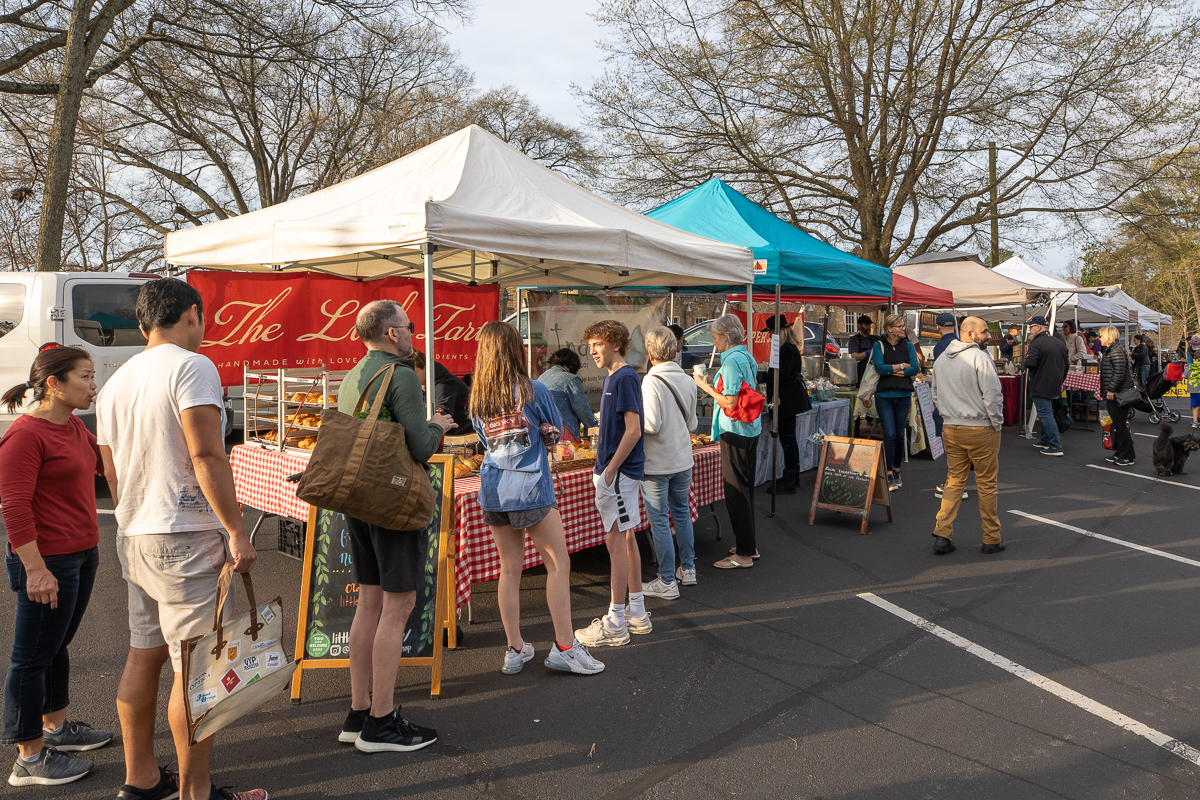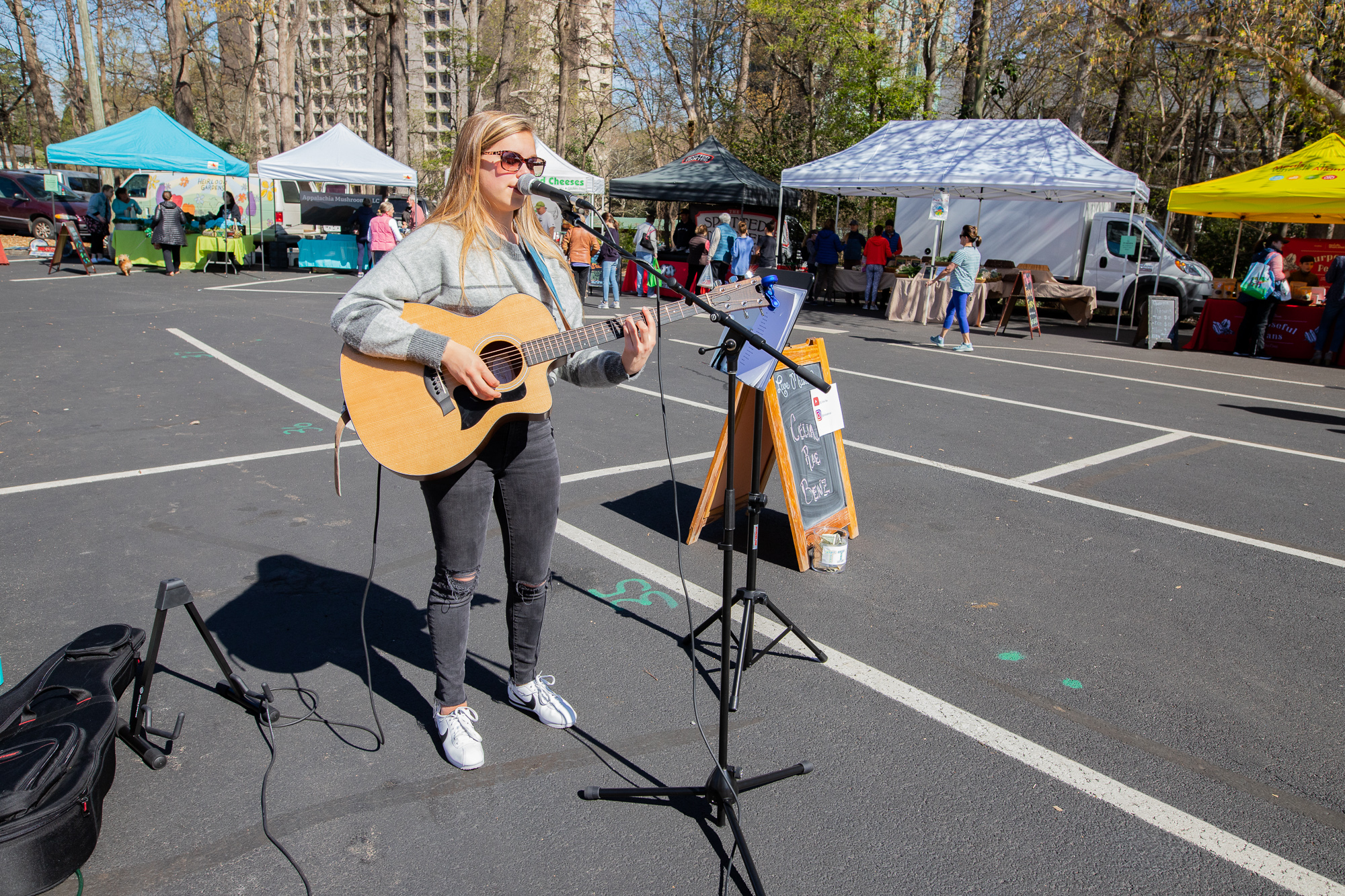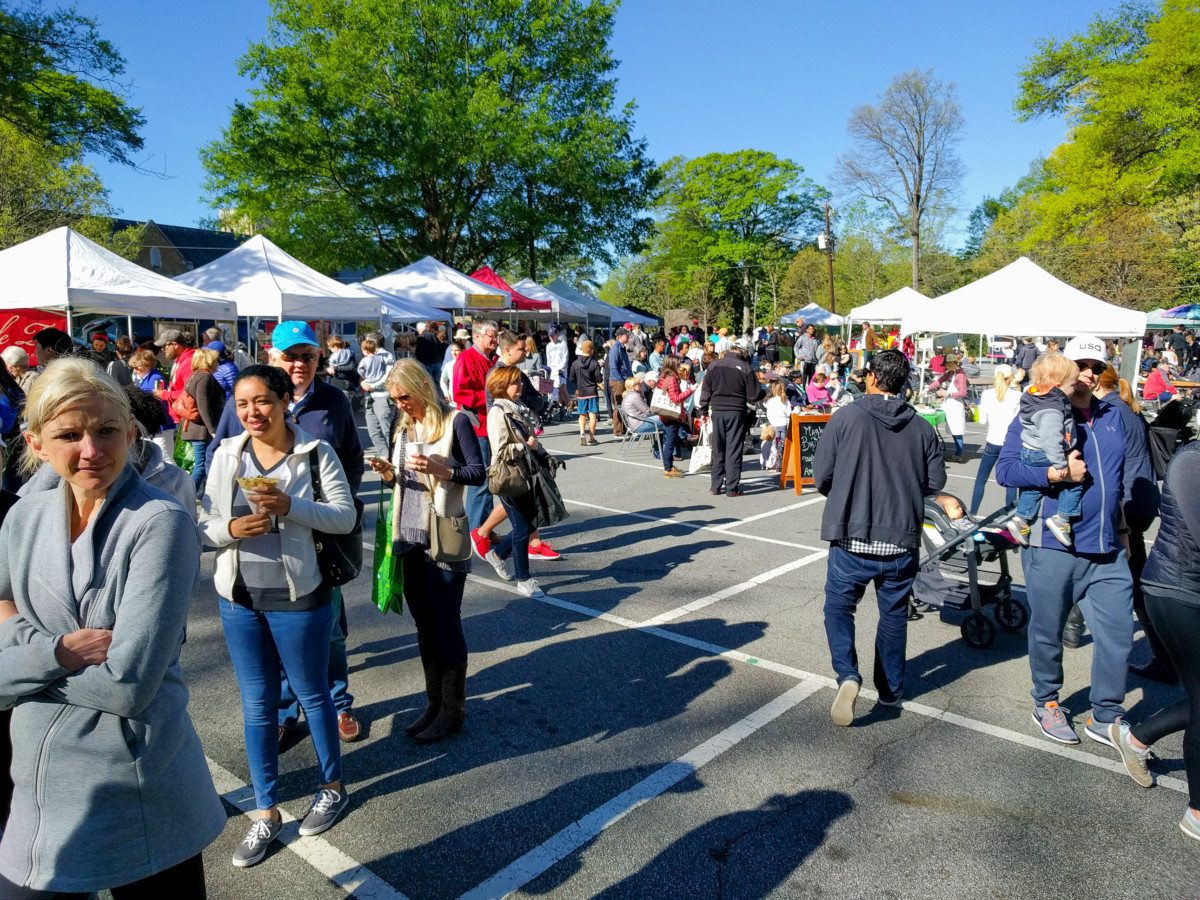


Restauranteur and Atlanta native Rich Clark is bringing his new steakhouse concept to Buckhead in 2025. Clark’s Steakhouse will occupy a ground floor space in the 2827 Peachtree Building on Peachtree Road in the Garden Hills neighborhood of Buckhead. The handsome brick facade will receive a facelift around the steakhouse, including gas lanterns and detailed millwork.
Clark has been known for his popular C&S Seafood restaurants in Vinings, Brookhaven, and Sandy Springs since 2007, but he began his culinary journey in Buckhead. He worked for Guenter Seeger at the Ritz Carlton before becoming the Matre d at Brasserie Le Coze, a sister restaurant of Le Bernardin in New York, for a few years. After a working at the Blue Ridge Grill, Clark served as general manager of the Atlanta Fish Market for five years.
Clark’s Steakhouse will occupy a new 6,000 square foot space that will be brought to life by CNNA and Z-Space Design. Clark says the new venture is inspired by classic New York steakhouses like Peter Luger and his favorite, Gallaghers. The design is the definition of “classic,” with real wood floors, walls, and ceilings, detailed millwork, exquisite terrazzo, and luxurious Scalamandre Velvet throughout. According to Clark, “When you walk in, you’ll feel like you’re in New York.”



A large central racetrack bar and open kitchen will combine to create “a fun, lively atmosphere,” but the focus will be squarely on the elevated dining experience. Gueridon service, uniformed servers, and an extensive wine list are a few highlights. Clark describes the new restaurant as “proper old-school dining.” The design includes a sound-dampening ceiling and plenty of space between the tables to insure diners can relax and enjoy the vibe.
The private dining room will be known as the Policy Room. Named for the back-rooms where lobbyist and lawmakers meet off-the-record to hammer out policy before their ideas see the light of day.

Clark’s Steakhouse will offer more than a curated dining experience. As he was refining his steakhouse concept over the past five years, Clark had an experience that changed the way he thinks about cooking steak. “I was always a high-top broiler guy, but then I went out to Texas and I changed my mind.” Clark had an epiphany when he tried steak cooked over open hard-wood flames. “It’s just a whole other ball of wax when you get it right.” All prime Meat by Linz, an in-house dry-aging program, and custom grills to prepare steaks over open hard-wood flame promise to create something unique. “When you put that dry age prime on live fire…” Clark explains, “I call it steak Jesus.”
Clark’s southern heritage will be on full display throughout the menu. Sides like savory sweet potato casserole, black-eyed peas topping the chopped salad, and a she-crab soup replacing the traditional lobster bisque. The dessert menu will have a southern accent with dishes like Coca-Cola chocolate pie, courtesy of Clark’s grandmother’s recipe.
A robust beverage program is yet another way Clark’s Steakhouse intends to stand out. At least a level 2 sommelier will be on duty at all times to insure wine is decanted and served at the proper temperature. Multiple wine rooms will offer diners the chance to walk-in with a sommelier and decant their bottles. Each wine room will be decorated with photos and art from regions where the wine is sourced.
Top-tier spirits and cocktails are to be expected as well. Clark says, “everything is going to be premium, but not so expensive you can’t afford it.
Buckhead is is full of great dining experiences. Clark’s Steakhouse promises to blend southern charm and meticulously crafted food and beverages with the essence of the classic New York steakhouse. Rich Clark is pulling no punches with his new venture. He promises, “Whatever you get there, it’s going to be perfect.
If you have driven down Peachtree Road in the last 60 days (who hasn’t?) then you probably noticed heavy construction activity surrounding the Park Place on Peachtree condo tower. The landmark residential tower is undergoing its first major renovation. Past president of the Park Place on Peachtree Condominium Association, Bryan Cooke told buckhead.com, “Parts of the interior have been renovated piecemeal, but the exterior has never been touched since we opened in 1987.” Cooke added, “many residential floors included in this renovation are overdue for a refresh.”
The iconic building at the intersection of Peachtree Road and West Wesley Rd. was in the news last year when one of its most famous residents moved out. Sir Elton John maintained a home at Park Place on Peachtree for 32 years. By the time he sold the unit for $7.225 million in November 2023, the 13,000 square foot residence spanned multiple floors and housed a vast art collection.



Park Place on Peachtree’s renovation project is underway with cooperation from HGOR, Smith Dalia, WJE, Harrison Design, Vandermeer Management, and Gay Construction Company. Cooke says the updates are designed to “Protect Our Place and Position,” as one of Buckhead’s premier condominium towers.
Residents have a lot to look forward to when the $15 million renovation is complete in February 2025. The first phase is scheduled to be complete in October 2024, including an updated new porte cochere on Peachtree Road, amenity lawn, all-new landscape with new trees, and an enlarged pool area.
Park Place on Peachtree’s 26 residential floors will receive updates to the common areas, including a new collection of art curated by Faulkner + Locke. The original art program will feature work by a diverse collection of Georgia artists including Angela West, Corinne Adams, Manty Dey, and Peter Essick.
It is nice to see a landmark property like Park Place on Peachtree receiving updates to insure it continues to be an integral part of the Buckhead community for years to come.
A rare and expansive 11.7-acre property in the heart of Buckhead is set to come to market, marking its first availability in a century. Located at 350 West Wesley Road and priced at $8.8 million, this property is one of the largest parcels to become available in the center of Buckhead in recent years. Situated just a few blocks west of Peachtree Road, this picturesque, hilltop property has been home to five generations of a prominent local family.
The property, positioned on the north side of Haynes Manor, offers walkability to various local attractions, including the farmers market, Bobby Jones Golf Course, and the Atlanta Beltline. The home on the property was built in 1912 and has been owned by the same family since 1927.
Elizabeth Ramsey, whose grandfather purchased what was formerly 100 Wesley Avenue 97 years ago, highlighted the property’s unique attributes. “The property is not only exceptional for its size and location but also for the peace and serenity it delivers. There’s so much greenspace there,” Ramsey said, noting that the vantage point “up on the hill” adds to its unique standing in the area.
Ramsey reminisced about the property’s charm, recalling how her grandparents had a stable on the property and would ride horses to what is now Lenox Square and the Buckhead Theater. She recalled how the home and surrounding land has been a source of joy for the family for five generations. “It is now time to let it go, and we are hopeful that the families who build their home on this land will feel the same sense of connection that we have for so long,” she added.
The family has enlisted Ben Hirsh of Hirsh Real Estate to market the property. “The expansive parcel presents various opportunities, including an expansive country estate, a multi-home family compound, or a cul-de-sac development,” Hirsh explained. The property is zoned R3, allowing for lot sizes of less than half an acre. “This is likely the last opportunity to acquire a parcel of this size in the historic core of old Buckhead,” noted Hirsh. The property listing can be viewed here.
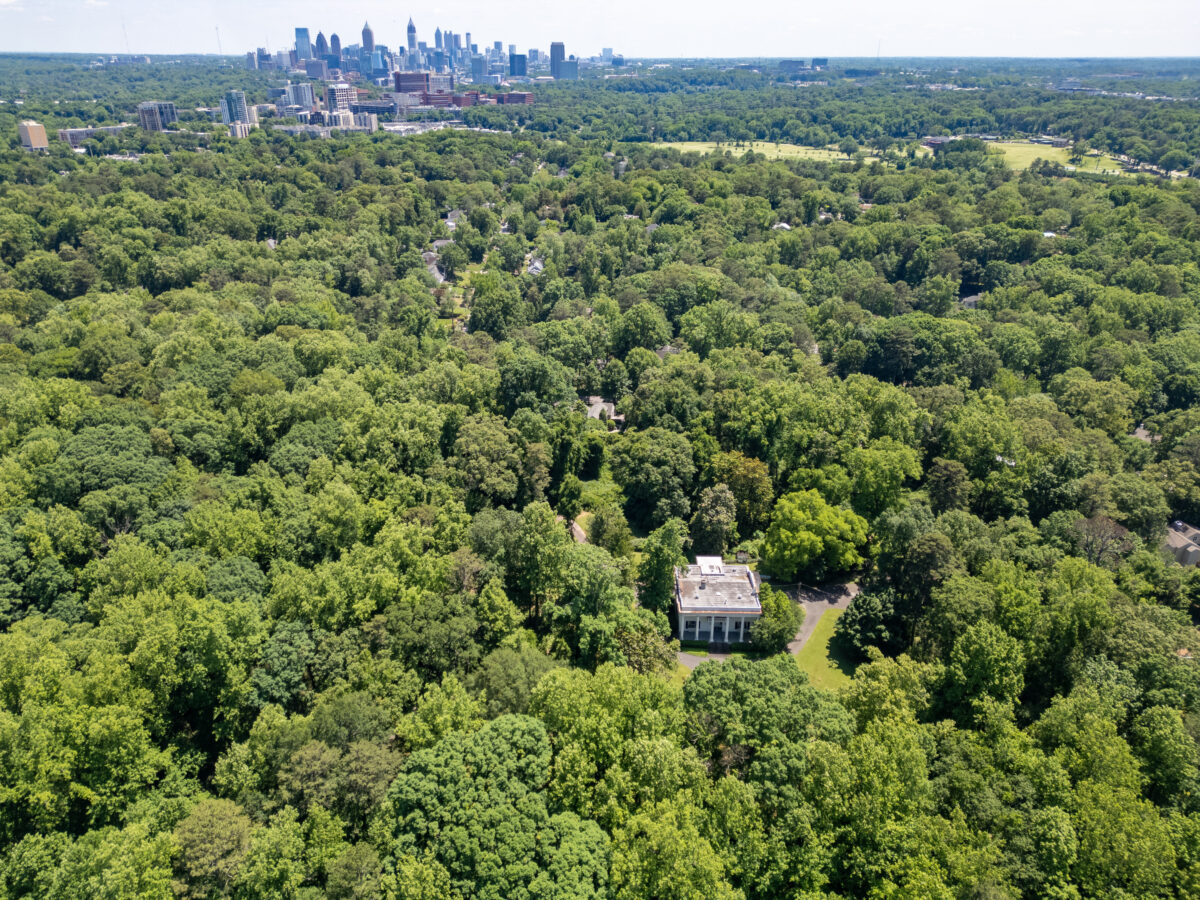
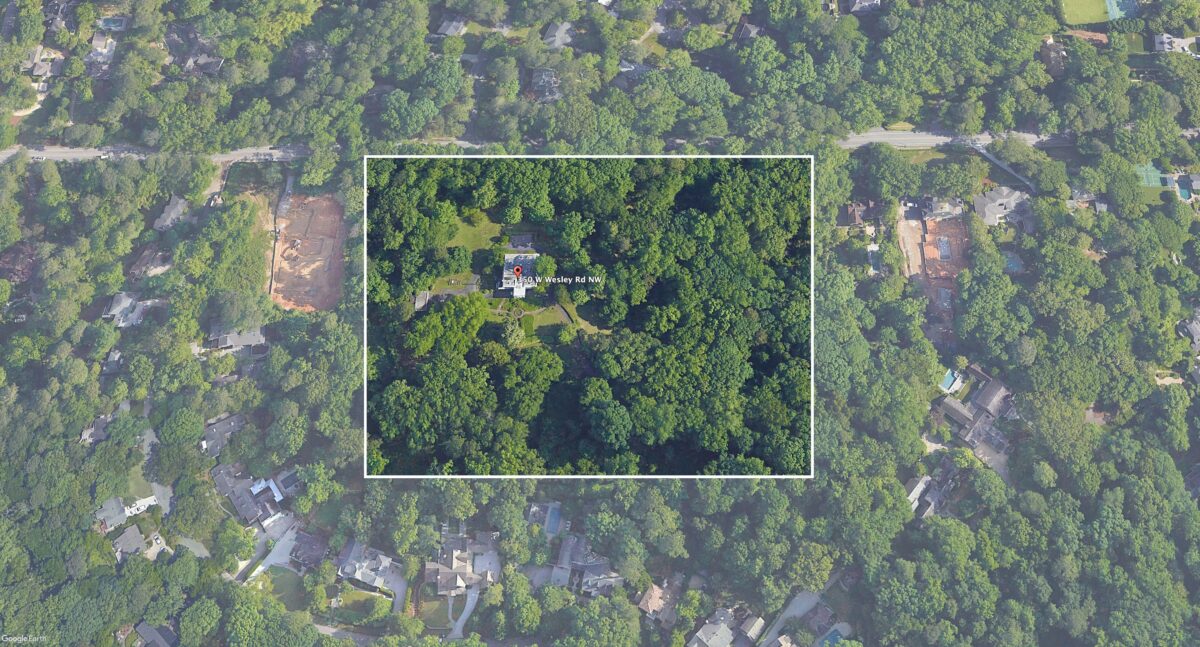
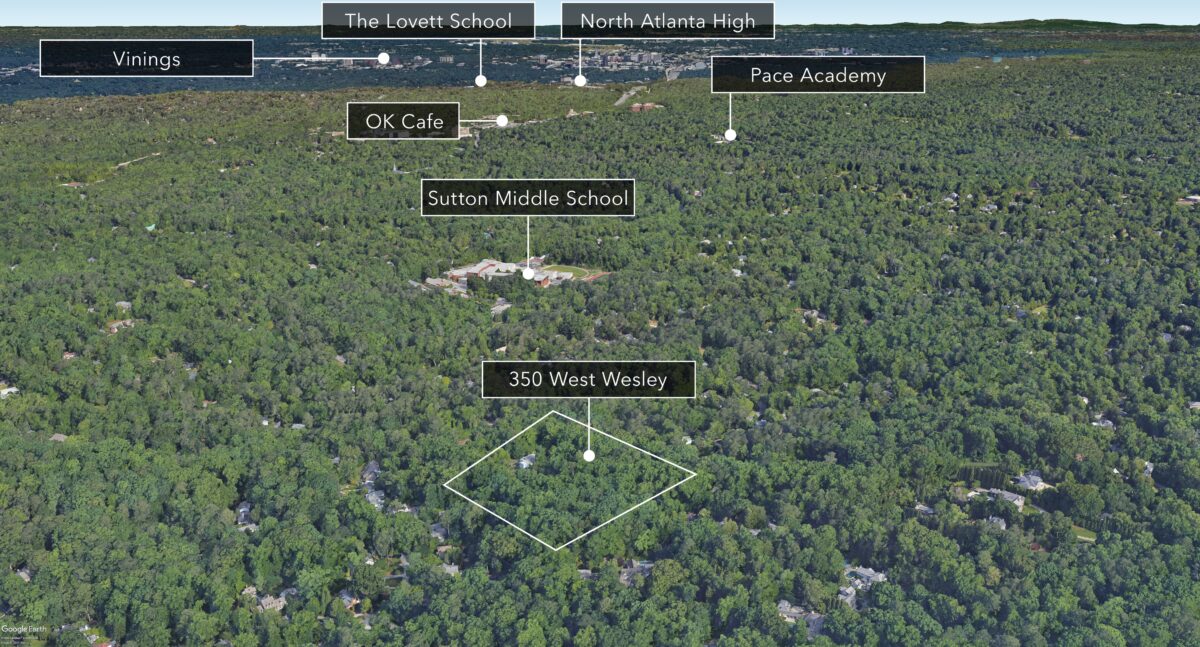
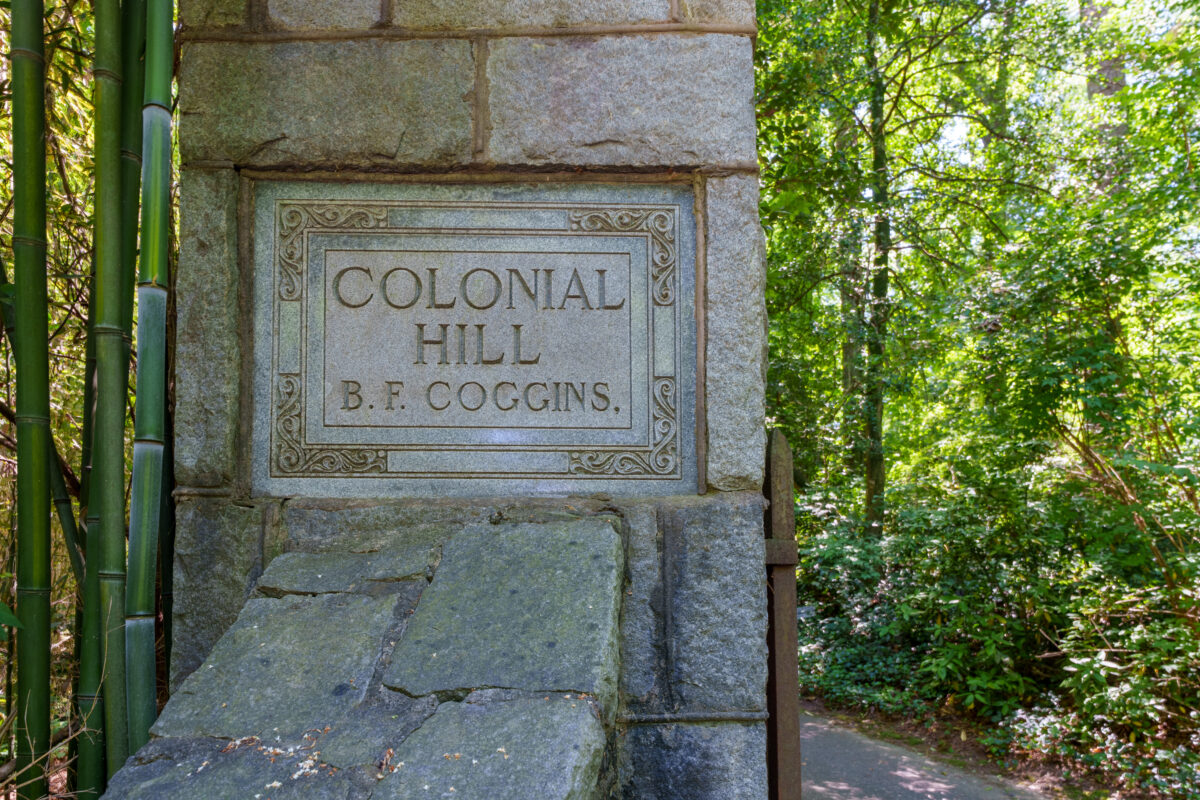
On July 9th, 2023 in Stockholm Sweden, Sir Elton John performed the final concert of his 53-year career. His farewell tour had spanned five years and grossed $931 million, reported to be the highest-grossing tour of all time. Meanwhile, halfway around the world, a curtain was closing on another part of the superstar’s life. Though he had called his Buckhead condo “home” since 1991, movers were quietly packing up and moving out a staggering volume of art and personal possessions from his nearly 13,000 square foot condo.
According to multiple Park Place residents, the move-out took nearly a month to complete and Sir Elton John has now left the building, Buckhead, and Atlanta for good.
“People always ask me, ‘Why do you have a place in Atlanta?’” John said in a 1998 AJC interview. “It’s because people here have always been that nice to me… I’ve always been welcomed. I feel at home.”
It all started in 1991 when John’s estate in England near Windsor became too full of memories and possessions. He gutted the residence and auctioned off many belongings while on his path to sobriety. In his search for a new home in the United States he found Los Angeles to be overwhelming and New York unsafe, and he fell in love with the Southern charm of Atlanta.
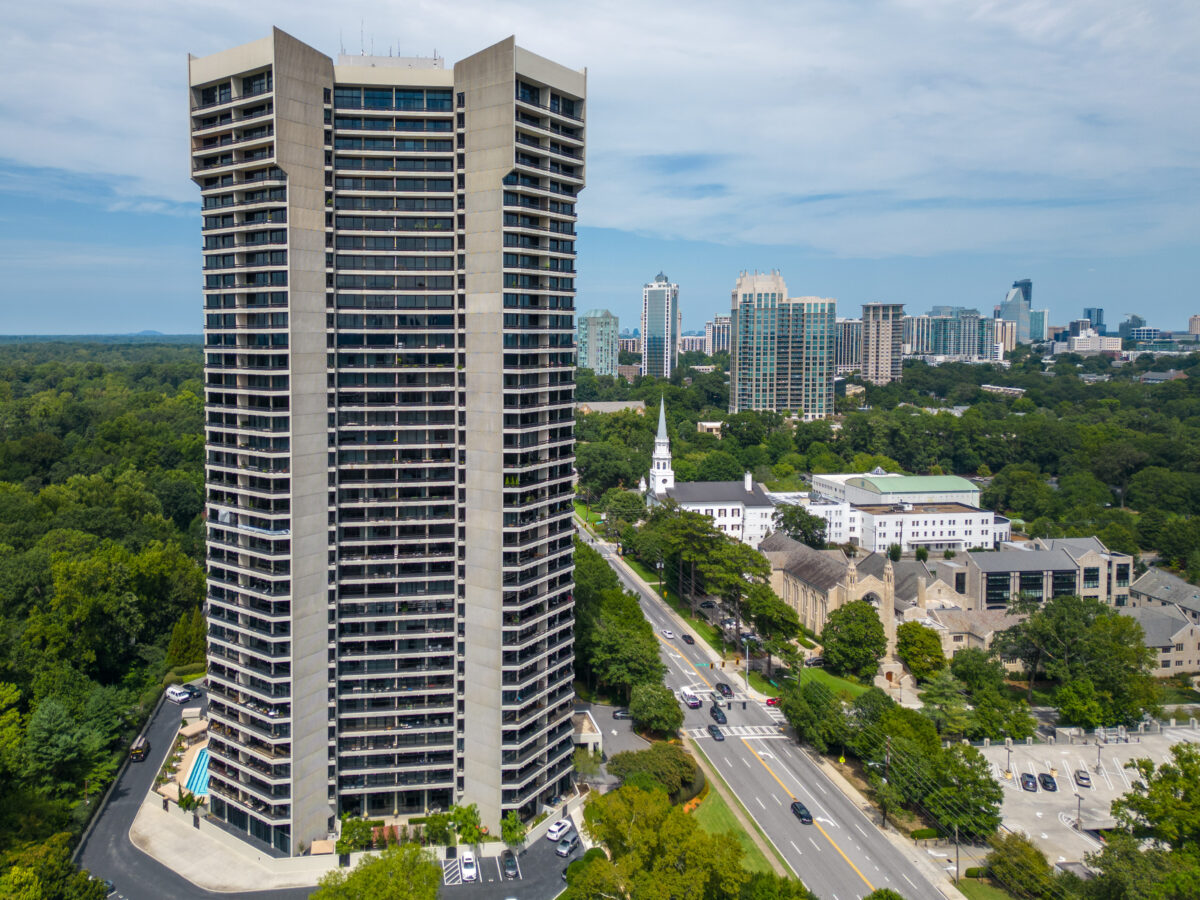
Jim Henderson, part of the development team behind the Park Place condo tower, remembers getting a call from the onsite sales agent in 1991 when he was on a sailing trip near Hilton Head: “I have Elton John here wanting to buy a condo,” she told him. The offer was $700,000, but Henderson was firm at his $950,000 asking price. “I eventually settled on $925,000 with his agent in London and by the time we were at closing 30 days later Elton had already decided to buy the unit next door. It was great PR for the building and we sold out the rest of the tower over the next couple of years. He was at a turning point in his life at the time and he ended up being great for the building. The other residents loved him and he treated our staff very well.”
After moving here in 1991 Sir Elton John quickly became ingrained into the Buckhead community and surrounding Atlanta area. He was a frequent visitor of Tower Records, dined at area restaurants (Umi Sushi and the now-shuttered Buckhead Diner were purportedly favorites), became a Braves fan, hosted a collection of his photographs at the High Museum of Art, named a 2004 album “Peachtree Road,” and became a frequent face at social functions throughout Buckhead and the Atlanta area.
John also commented that his life “in Atlanta is as normal a life as I can lead anywhere in the world,” and later said he is “an Atlanta person through and through.”
Over the years, Elton continued to purchase neighboring units to accommodate a vast art collection. Eventually it expanded to include 12,000 + square feet across seven units combined on multiple floors in Park Place. The condo above the intersection of Peachtree Road and West Wesley Rd in the heart of Buckhead is likely to hit the market soon. In a 2016 CBS Sunday Morning interview, viewers got a brief tour of his sprawling condo that was full of artwork and photography collections. The singer was generous with his artwork, loaning it out to the building for display in some common areas and elevator lobbies.
During John’s final Atlanta concert last year, he addressed his semi-hometown crowd about his time in Atlanta.
“I’ve lived here for 30 years, and I’ve loved every single minute,” the AJC reported. “So I will take you with me in my heart, in my soul, and I’ll never forget you.”
Longtime Buckhead resident Wright Mitchell will lead historic conservation efforts throughout the state after being named the President and CEO of the Georgia Trust for Historic Preservation. Mitchell, a graduate of the Lovett School and founder of the Buckhead Heritage Society, will step into his new role September 5th to replace the Georgia Trust’s outgoing President and CEO Mark C. McDonald.
Mitchell said it is an “honor” to lead the organization, and he aims to continue build on the foundation set by McDonald’s 15 years of increasing membership, implementing new initiatives and working alongside local preservation groups in the state.
The Georgia Trust is currently celebrating its 50th year. The organization’s efforts include protecting, revitalizing and preserving historic buildings and places throughout the state. One of its current efforts is to help preserve a historic lodge on Peachtree Battle Avenue.
Mitchell said his interest in history was sparked by his parents, also Buckhead residents, who took him to historic sites throughout the state, including Kennesaw Mountain and the Battle of Bloody Marsh site on St. Simons Island.
“I was very interested, even at a young age, in these events that had occurred in my own state,” Mitchell said. “It grew a fire in me, that grew into a passion, and I’ve been involved with it pretty much my entire life.”
Mitchell’s background includes a successful private practice law career in which he drew from his passion for history to specialize in civil litigation and historic preservation law.
In 2005, he founded the Buckhead Heritage Society, a nonprofit organization, and served as its volunteer president for 10 years. He currently serves as a board member for the organization. Mitchell said Buckhead did not have its own local historical society, and after speaking with local civic leaders at the time, there was a “consensus it was sorely needed.” Like the Georgia Trust, the Heritage Society aims to protect Buckhead’s historic resources.
The Heritage Society’s fist project, the restoration of Harmony Grove Cemetery, won the Georgia Trust’s Excellence in Rehabilitation Award in 2009, furthering his connection to the organization he will now lead as president and CEO. Mitchell also served on the Trust’s Board of Trustees from 2006 to 2012, including as vice chairman.
More recently, the Heritage Society was awarded the 2020 Excellence in Rehabilitation Award for its efforts to broker a deal with the City of Atlanta to relocate the Randolph-Lucas-Jones House from Buckhead to Ansley Park for its preservation.
Mitchell’s historic conservation efforts will span the state in his new role, but among the projects he said will be supported by the Georgia Trust is the preservation of the lodge at the entrance of the Peachtree Battle neighborhood. The lodge was developed in the early 20th century by Eretus Rivers — from which E. Rivers Elementary School is named — that served as a sales office for Rivers’ realty company, Mitchell said. The building was later deeded to Fulton County and serves as a kindergarten. It is currently owned by Atlanta Public Schools.
Mitchell said APS has placed the building on its “disposal list,” and there are currently efforts to ensure its preservation. One of the challenges, Mitchell said, is there are deed restrictions placed on the property dictating it can also be used for specific purposes related to education, monumental or park uses.
“The group taking the lead is the Buckhead Heritage Society, but at the Georgia Trust, we always want to support local preservation group efforts,” Mitchell said. “It is certainly a building worth preserving, and we want make to make sure the deed is honored. Ultimately, we’d like to see APS and Buckhead Heritage Society sit down and figure out a way to preserve the building in the way it was intended.”
In addition to roles leading the Georgia Trust as an emeritus board member of the Buckhead Heritage Society, Mitchell is also a member of The Lovett School Board of Trustees. Previously, Wright served on the board of the Atlanta Preservation Center and was appointed to the Georgia Governor’s Mansion Executive Fine Arts Committee and City of Atlanta Sesquicentennial Civil War Commission.
Wright lives in a historic home in Buckhead with his wife, Antonia, and two children.
Where Habersham Road and Cherokee road meet you will find this beautiful home, the epitome of Buckhead living. The original Neel Reid designed home was built in 1921, and displays the grace and charm that is so rare and sought-after. Behind the stately facade you will find a completely renovated home built for modern family living. The spectacular hilltop lot is nearly three acres and 1000 feet deep!
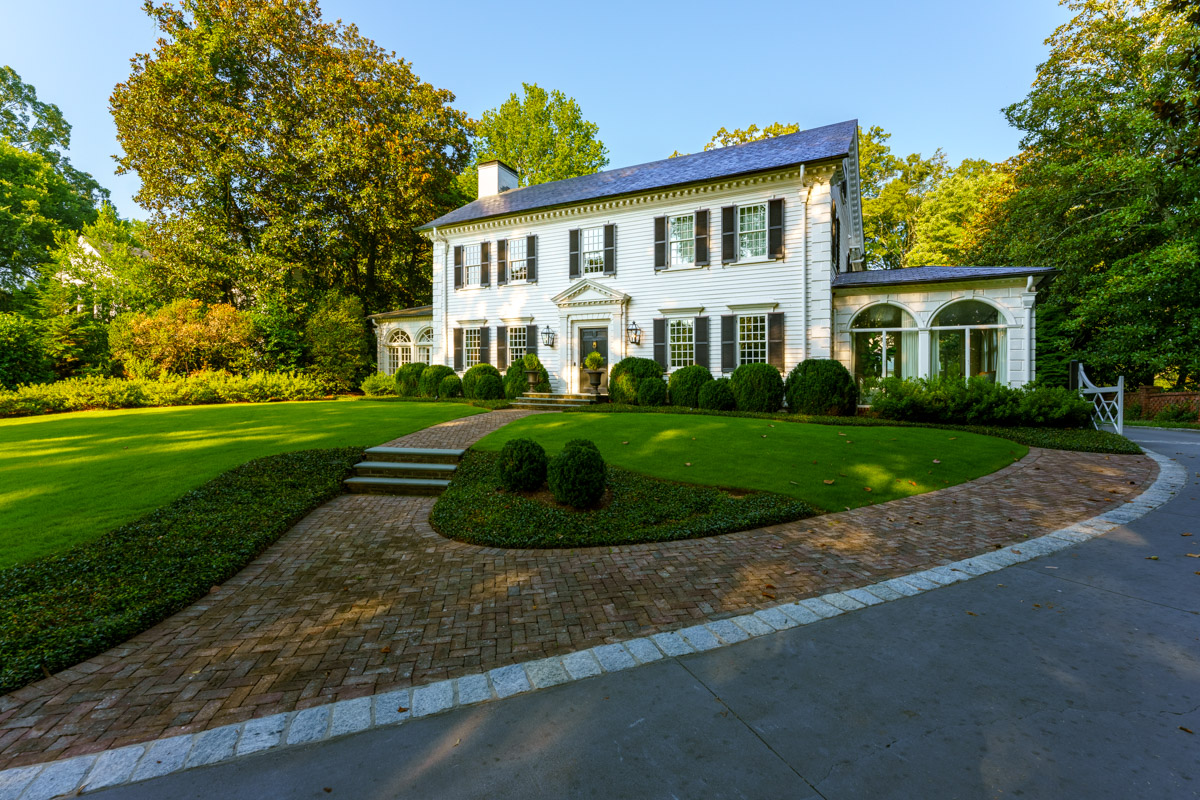
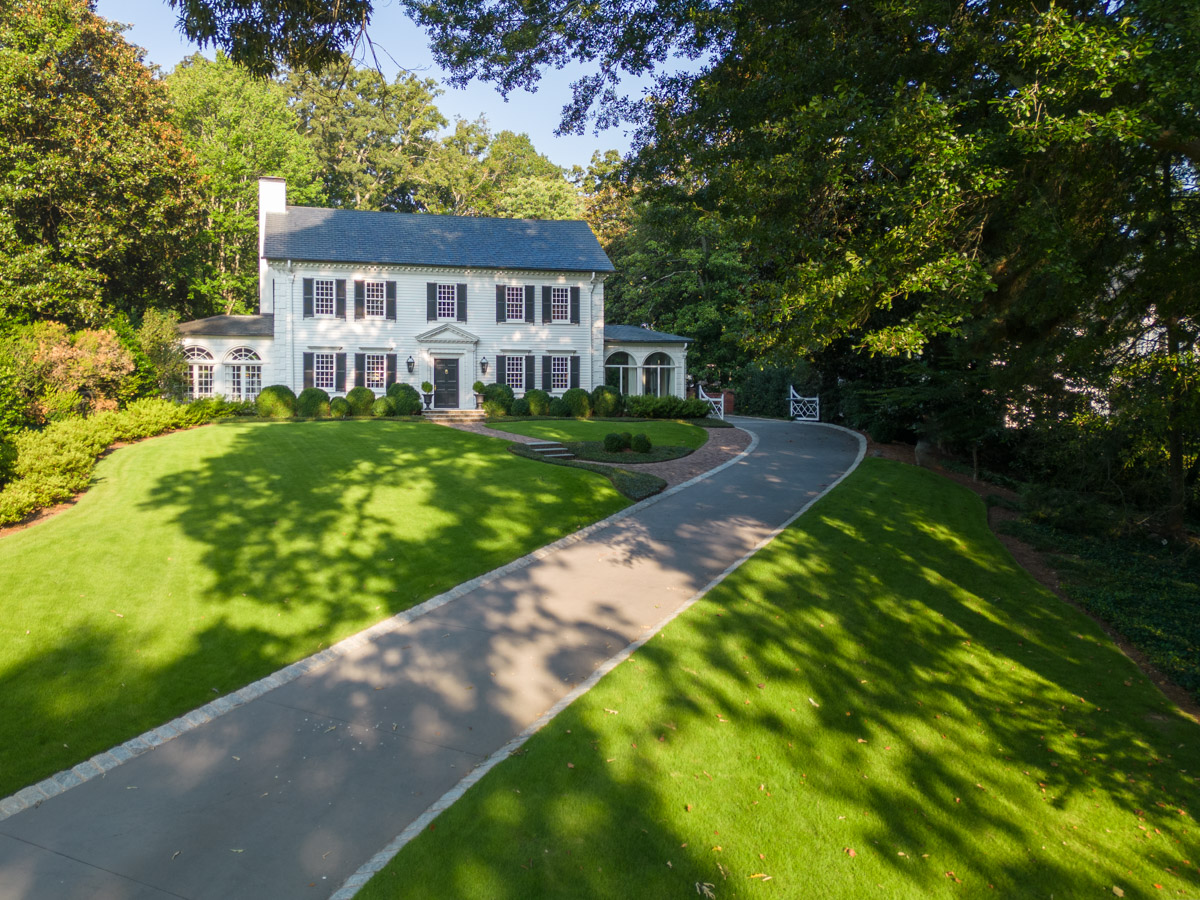
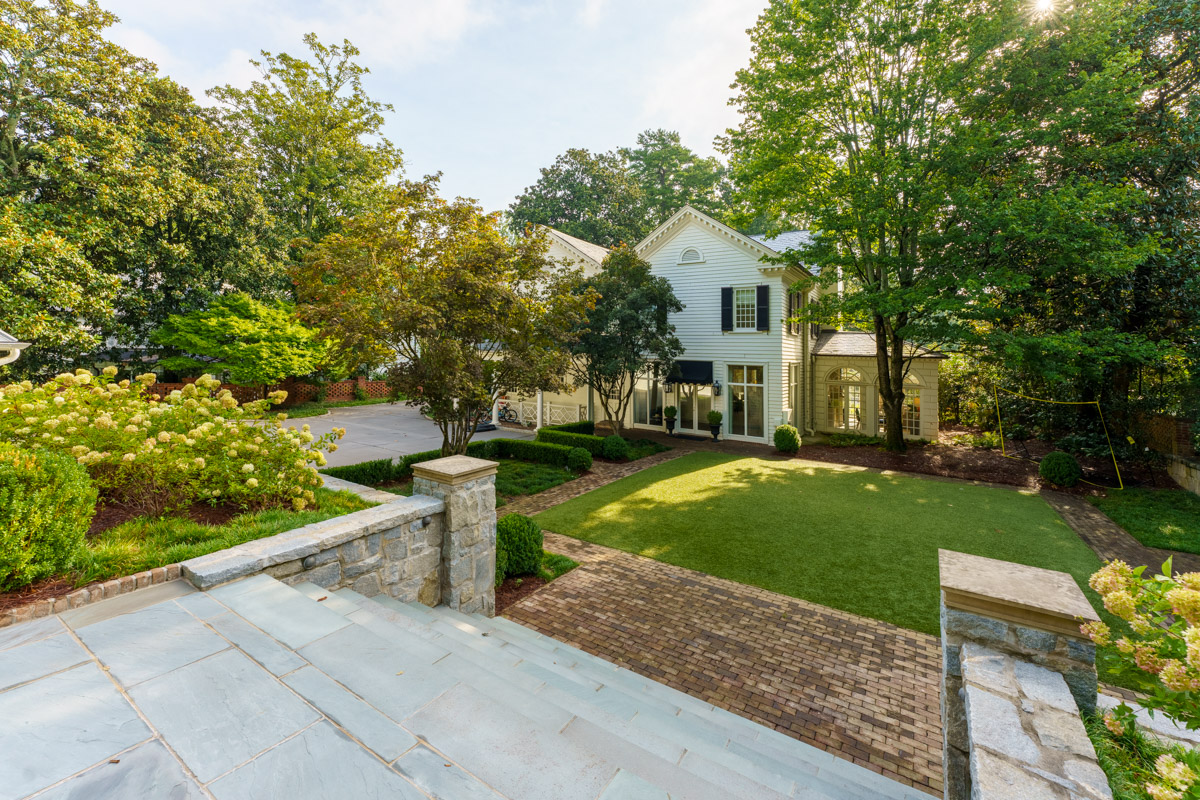

The renovation, completed in 2018, was designed by Amanda Orr and built by Jason Cole. Beautiful finishes and modern amenities were added while keeping the historic charm of the original home.






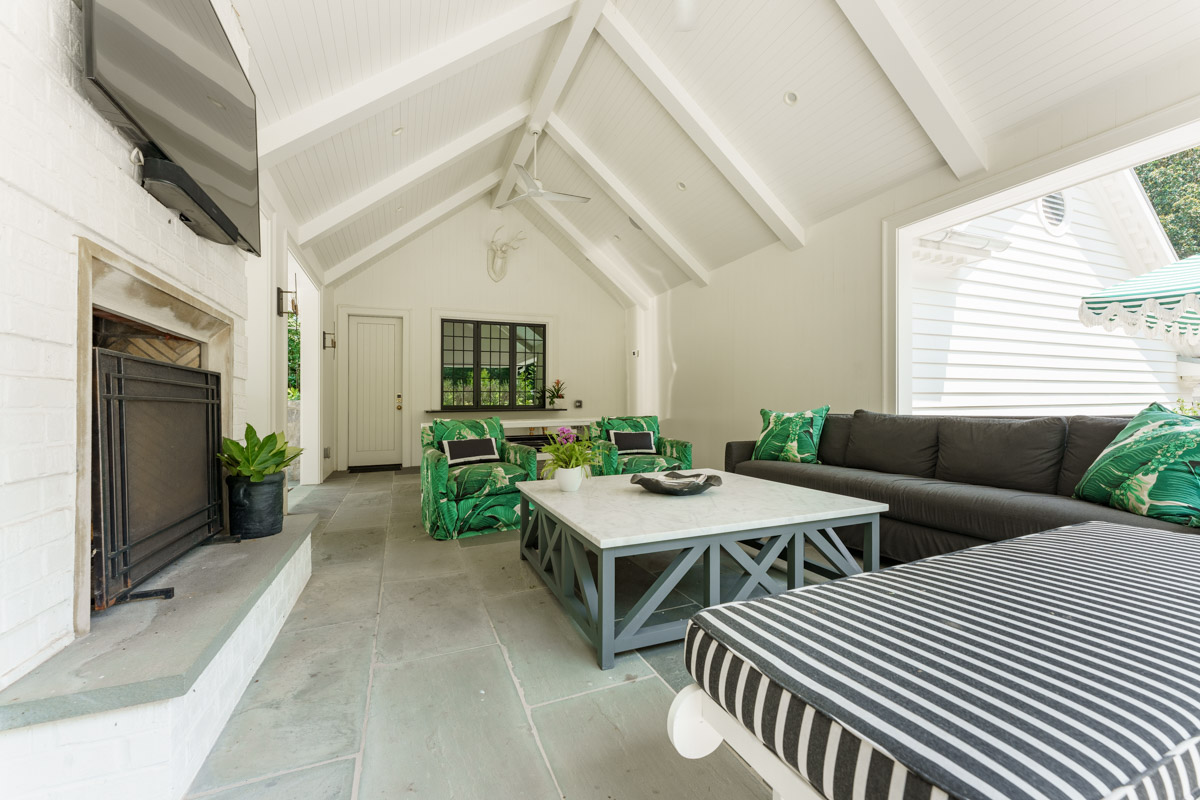








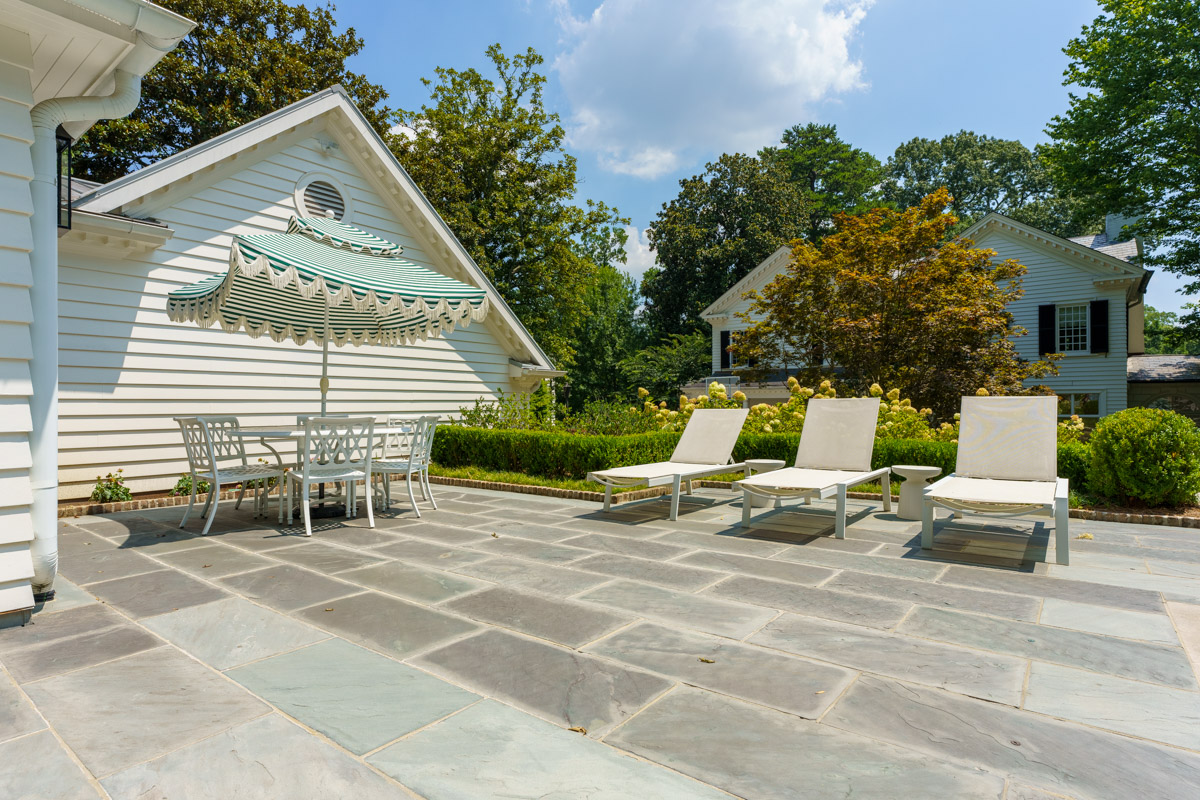
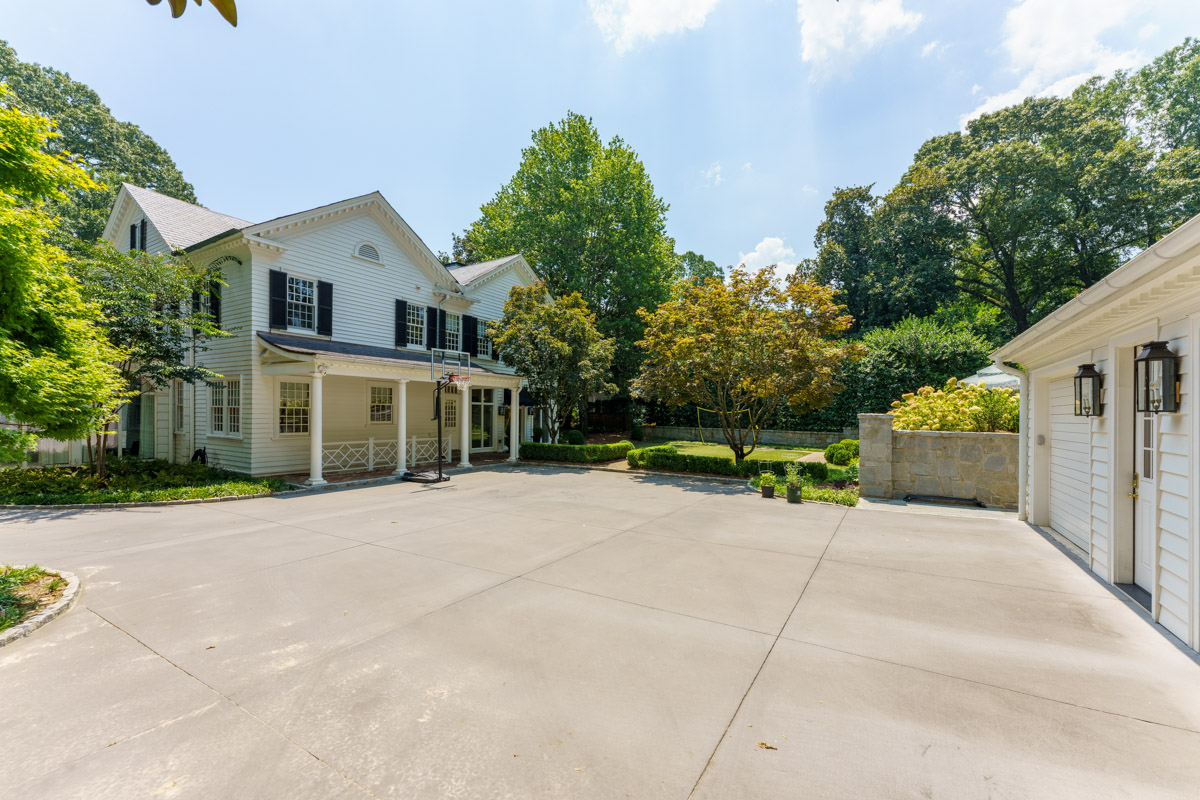
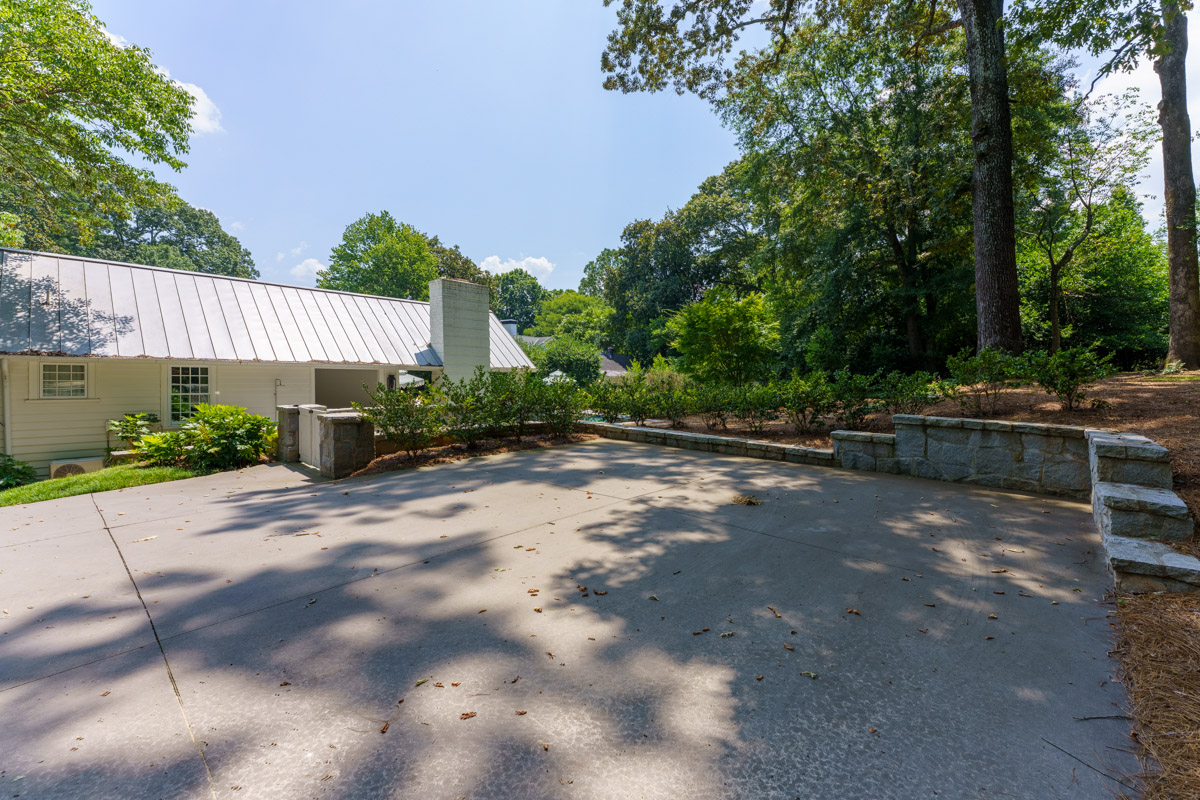
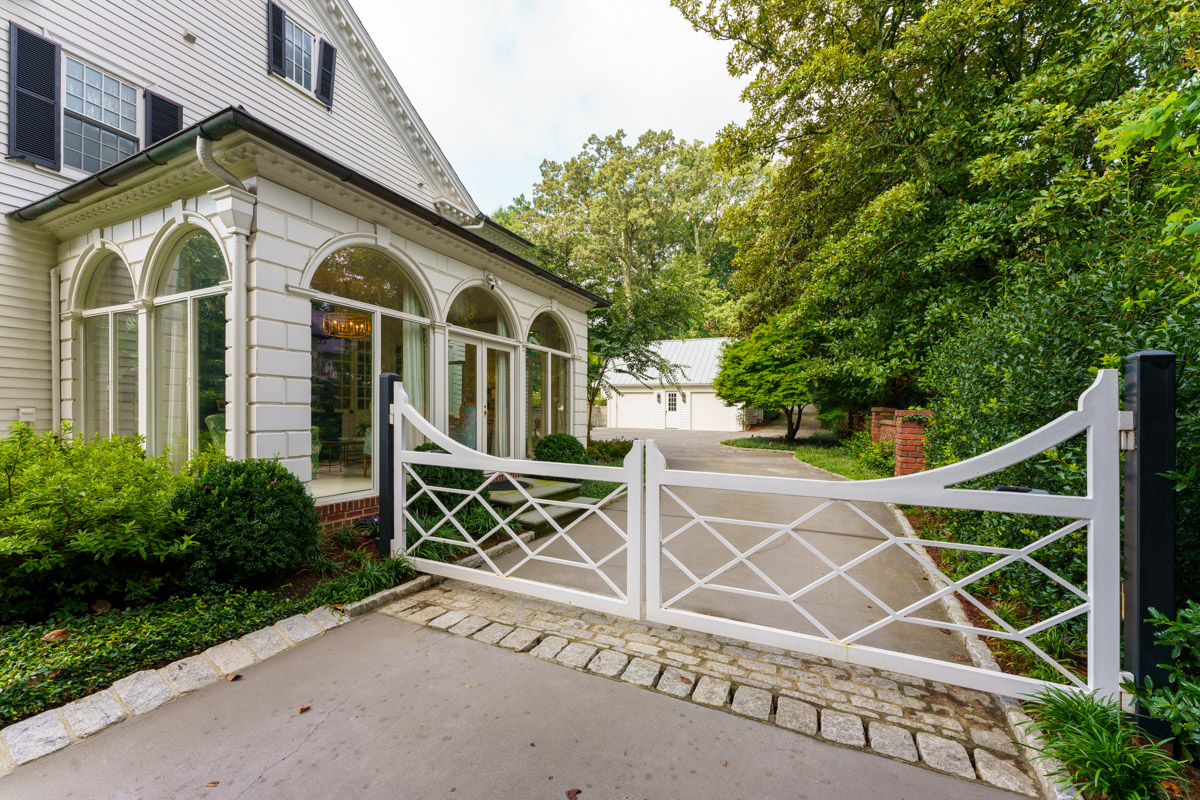
Also added during the renovation was a detached 2-car garage and a dreamy pool house. The pool house features a covered outdoor living area, half bath, and a kitchenette. The unfinished upper level of the garage can be connected to the pool house to create a full guest suite.
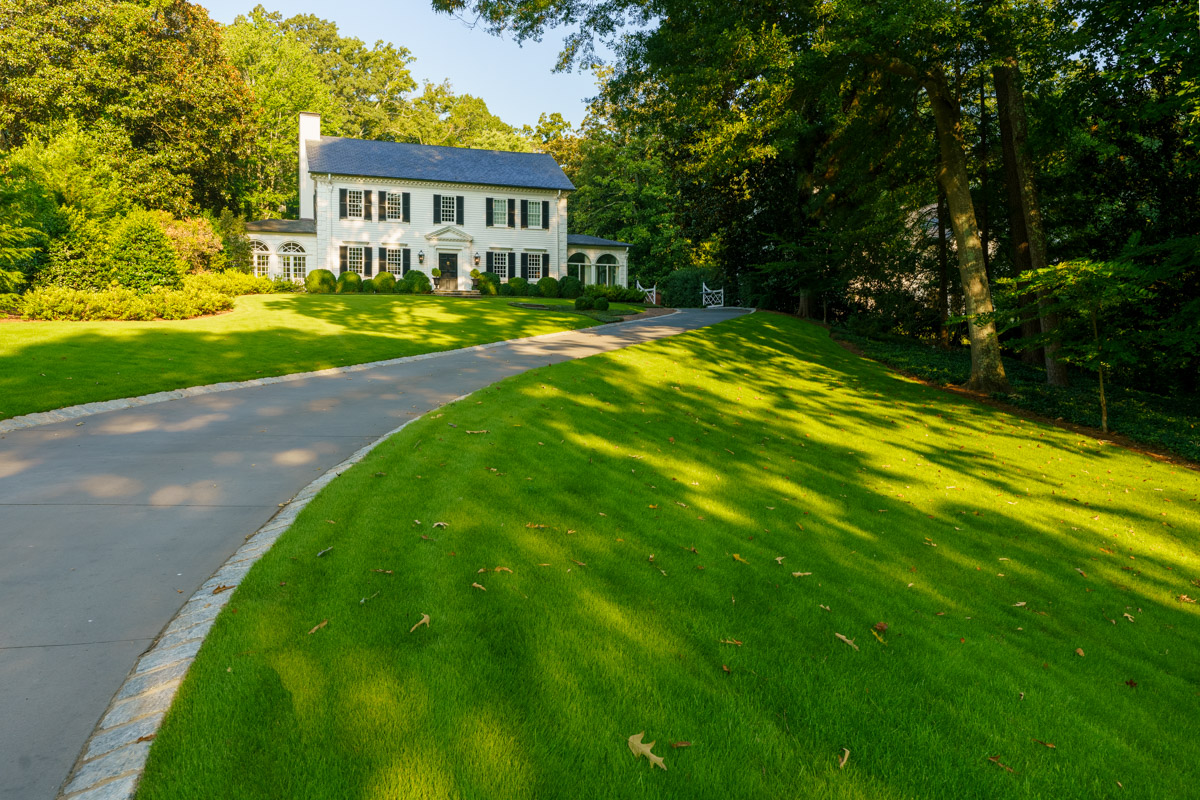

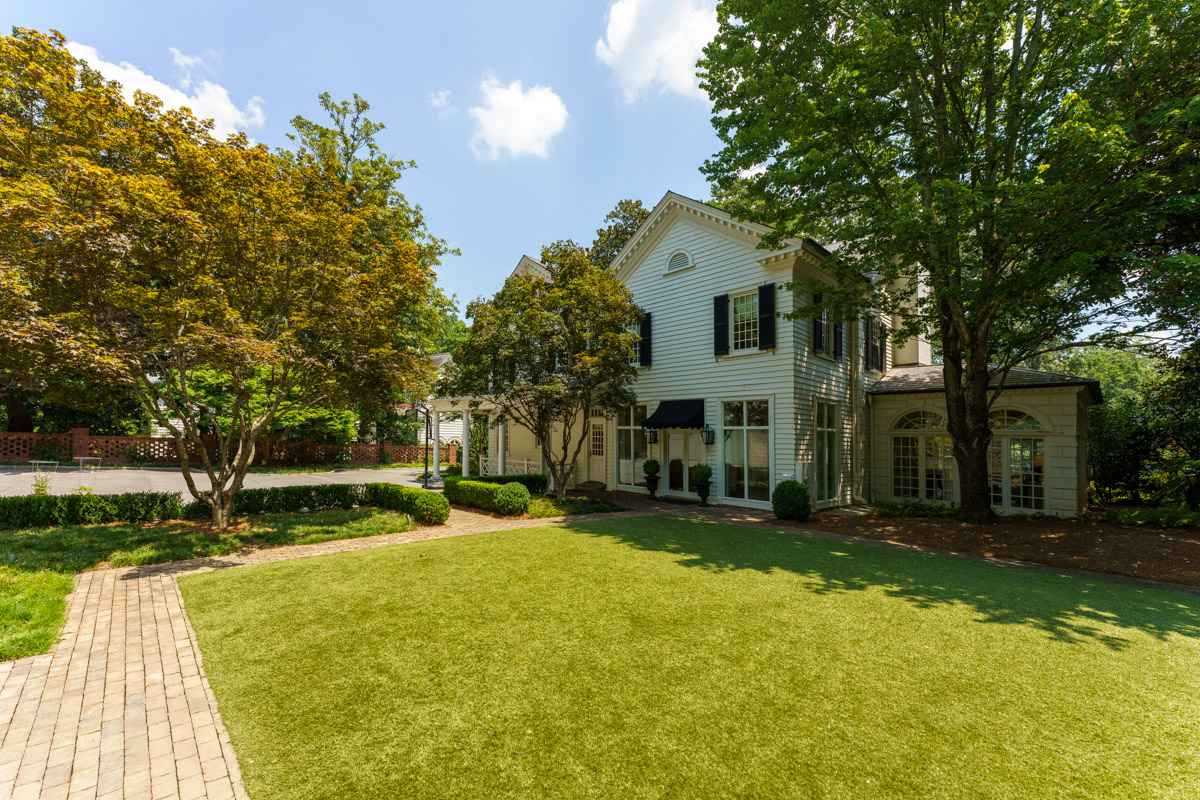

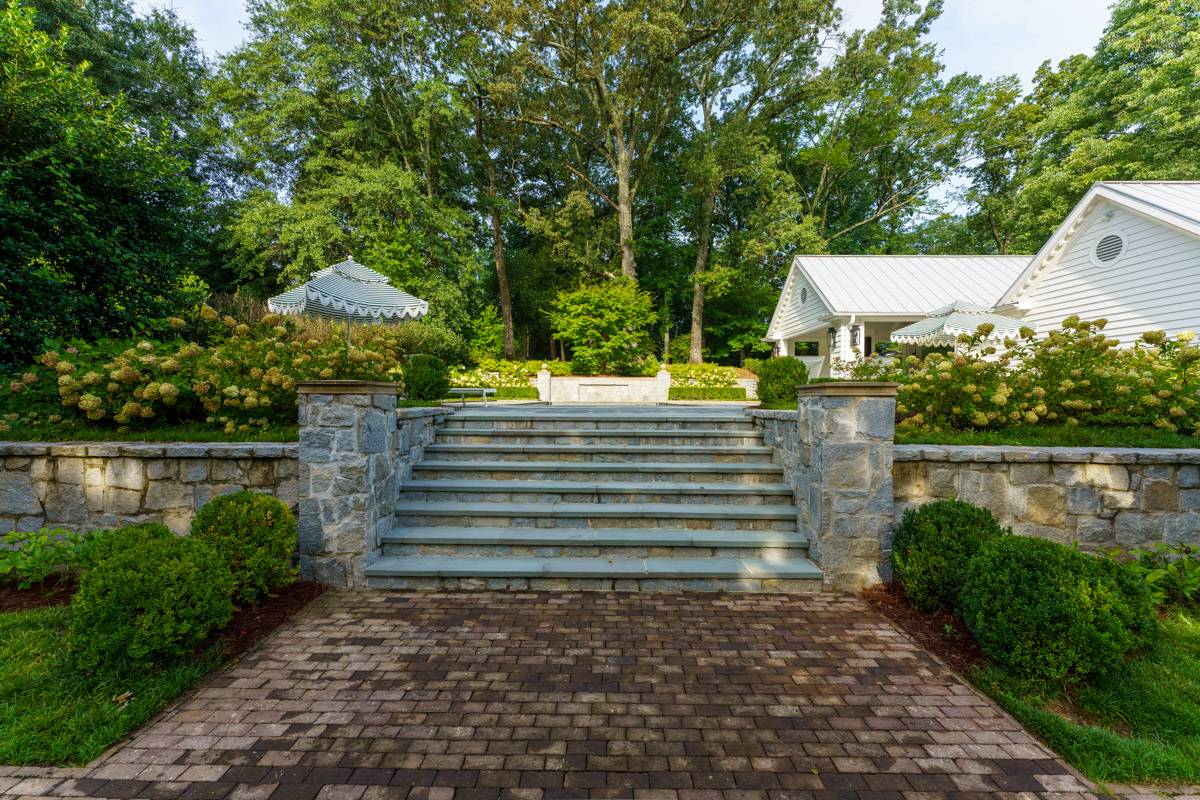
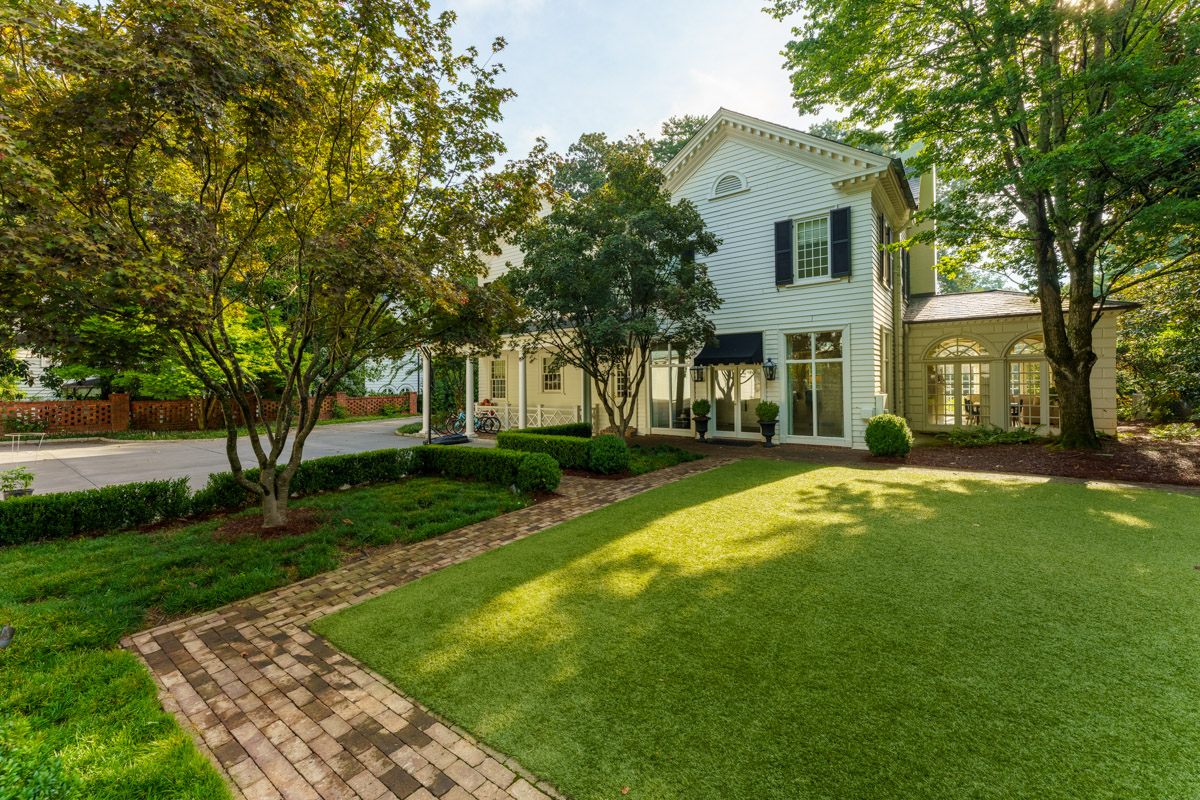

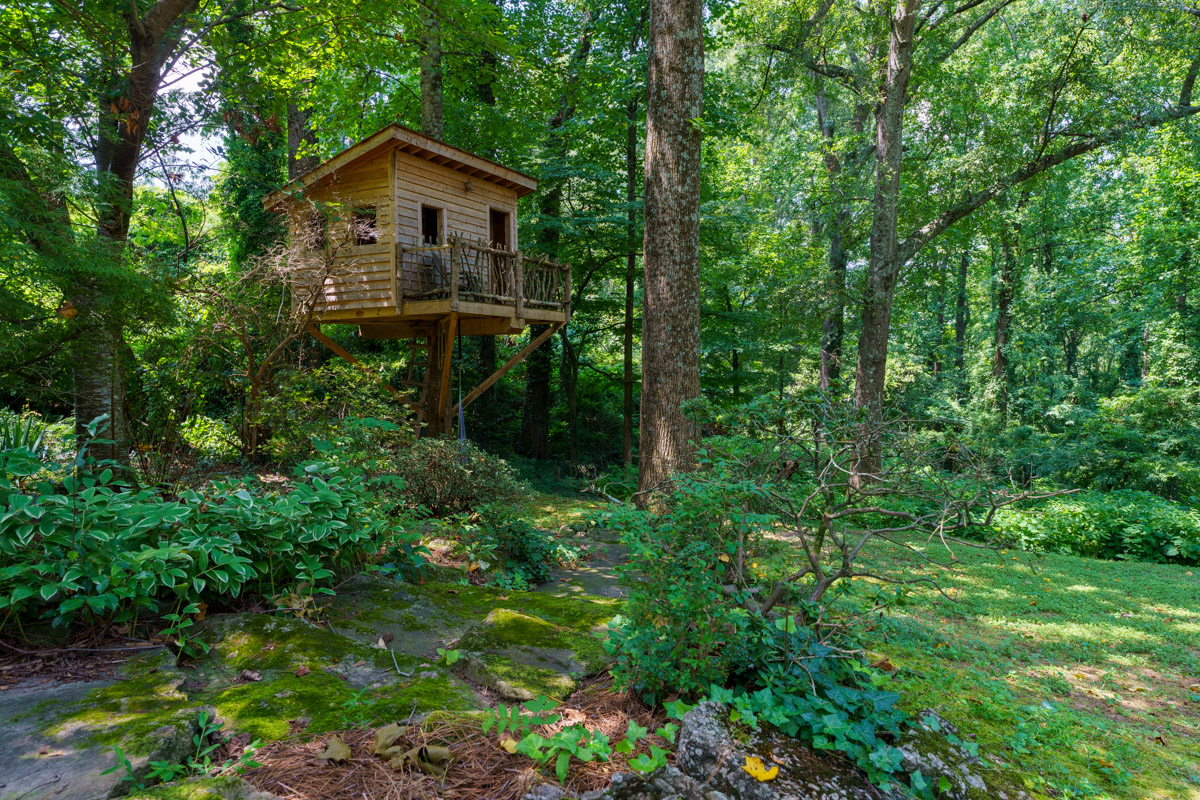
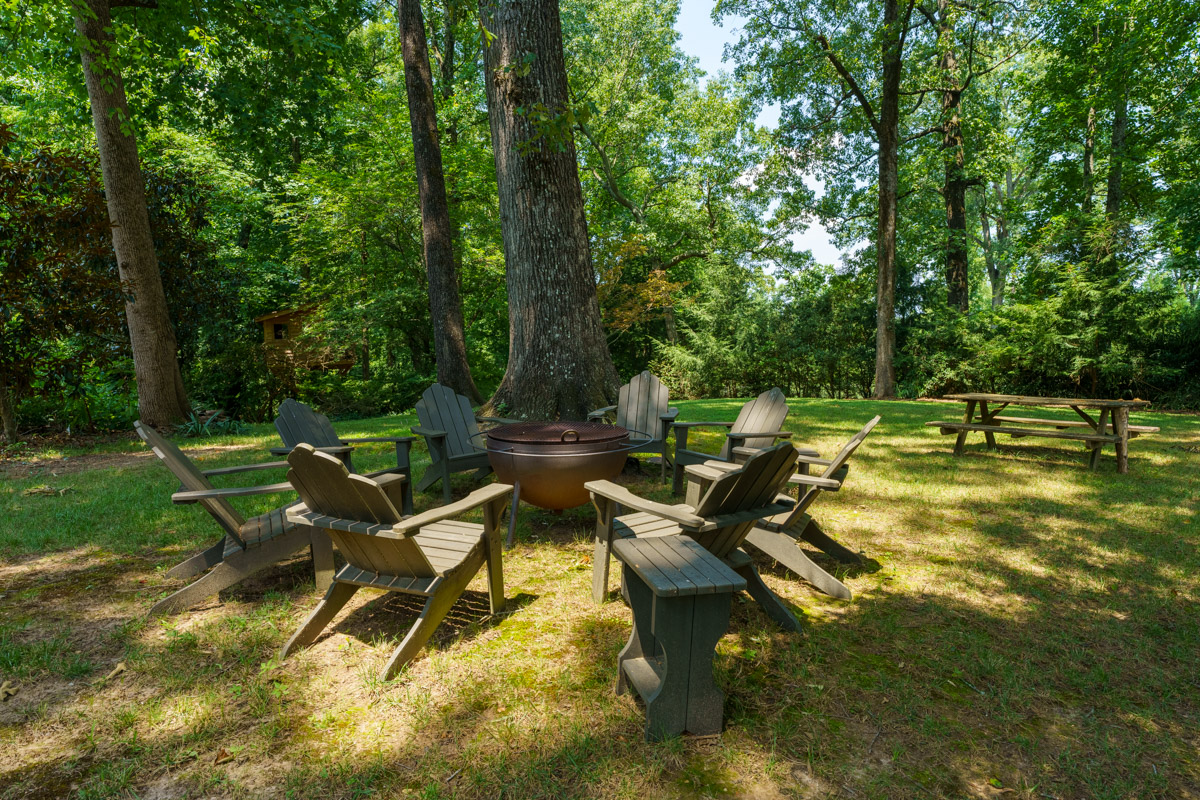
The home rests more than 180′ from Habersham road, creating a dramatic front yard with a winding drive. Land Plus designed the pool terrace, turf play yard, and the rest of the idyllic backyard features. Beyond the pool terrace and outdoor kitchen is a hilltop fire pit, the perfect place to watch the distant sunset from one of the highest elevations around. Past the fire pit is a fantastic tree house that overlooks the forest beyond. The 2.79 acre lot stretches some 1000 feet from the road to the back of the lot!
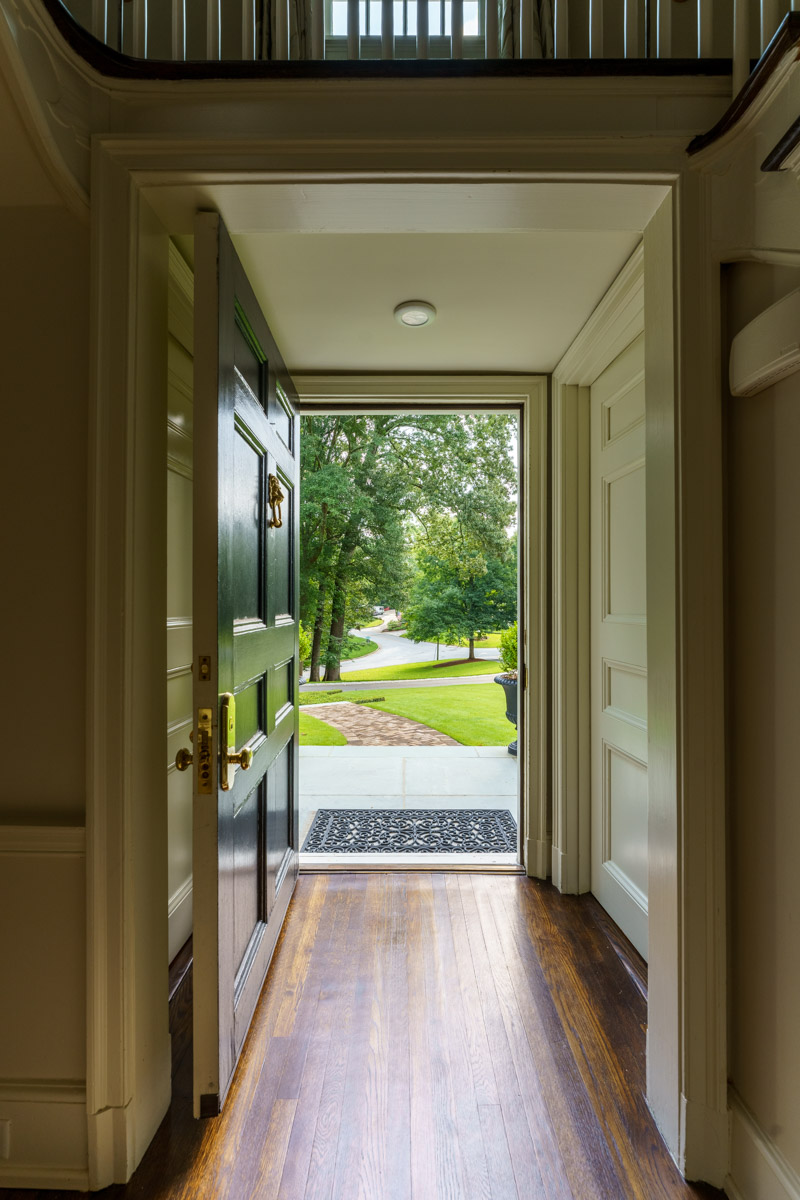
The 2-story entry foyer is flanked by the living room and dining room, each with an attached sun-room, in a traditional symmetrical layout. The large dining room features detailed mill work and original French doors leading to the sun room. An attached butler’s pantry provides generous storage between the dining room and kitchen.








The living room has a gorgeous marble fireplace surrounded by an intricate mantle. Twin cased openings lead to a sun room with its own fireplace. An adjacent playroom has custom built-in storage, and access to the backyard and kitchen.






The bright, remodeled eat-in kitchen is built around a huge central island with built-in storage and seating for four. The breakfast area with built-in banquette provides additional seating. White cabinets surround the island, with stone counter tops and a farm sink. Additional features include a professional Wolf range, panel-front appliances, and stylish brass accents.




The upper level contains three bedroom suites, including the primary bedroom. The primary suite features a oversized bedroom, walk-in closet with additional dressing room, and a large ensuite bath. The primary bath has double vanities, a soaking tub and separate shower, and distinctive tile finishes throughout. A convenient stackable laundry is located in the hall, which is in addition to the housekeepers washing and ironing room that is located on the terrace level.






The two additional bedrooms feature beautiful ensuite baths and large closets with custom storage.






The third floor features a guest bedroom and a full bath, plus access to two large storage areas.


The lower level is accessible from the kitchen and from an outside door from the backyard. This level houses the laundry room, a half bath, and multiple storage areas.
This home presents a rare opportunity in the coveted Peachtree Heights West neighborhood, inquire for additional information!
The Lodge, an over 110-year-old house-like structure at Peachtree Battle Avenue and Peachtree Road, played a key role in Buckhead’s past. Now the question is where it fits into Buckhead’s future as Atlanta Public Schools (APS) has pegged it for sale as “surplus.”
Preservationists and community leaders are concerned, but have reason to hope the Lodge won’t join the neighborhood’s long list of lost historic structures. APS has a new system for prioritizing historic preservation and community input in plans for surplus buildings in which the Lodge figures prominently. And the Buckhead Heritage Society appears to be examining the feasibility of buying the building itself.
“Buckhead Heritage firmly believes that preserving and protecting the Lodge is of utmost importance,” said the historical society in a statement written by board member Thorton Kennedy. “As an advocacy organization committed to safeguarding Buckhead’s rich historical resources, we look forward to working collaboratively with APS to develop a comprehensive plan for the preservation of this significant building.”
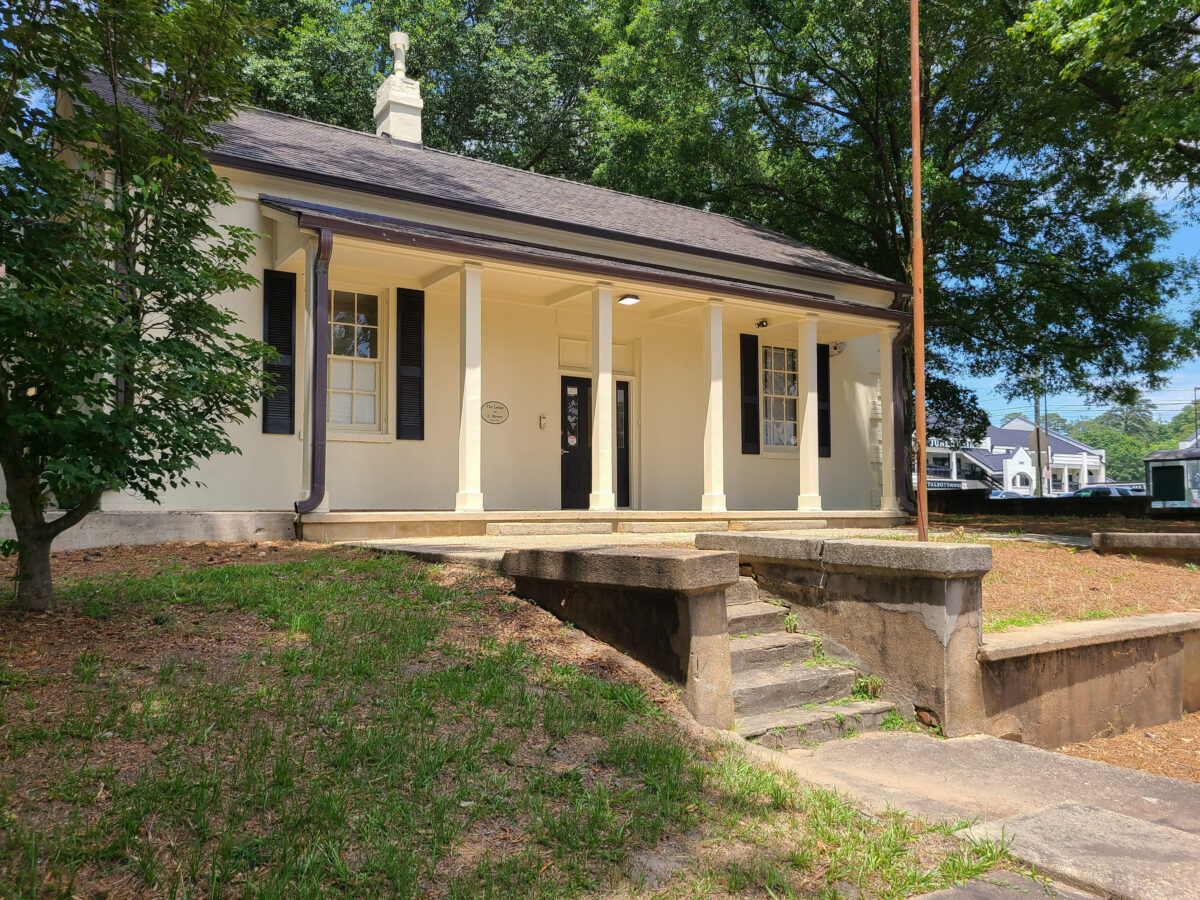
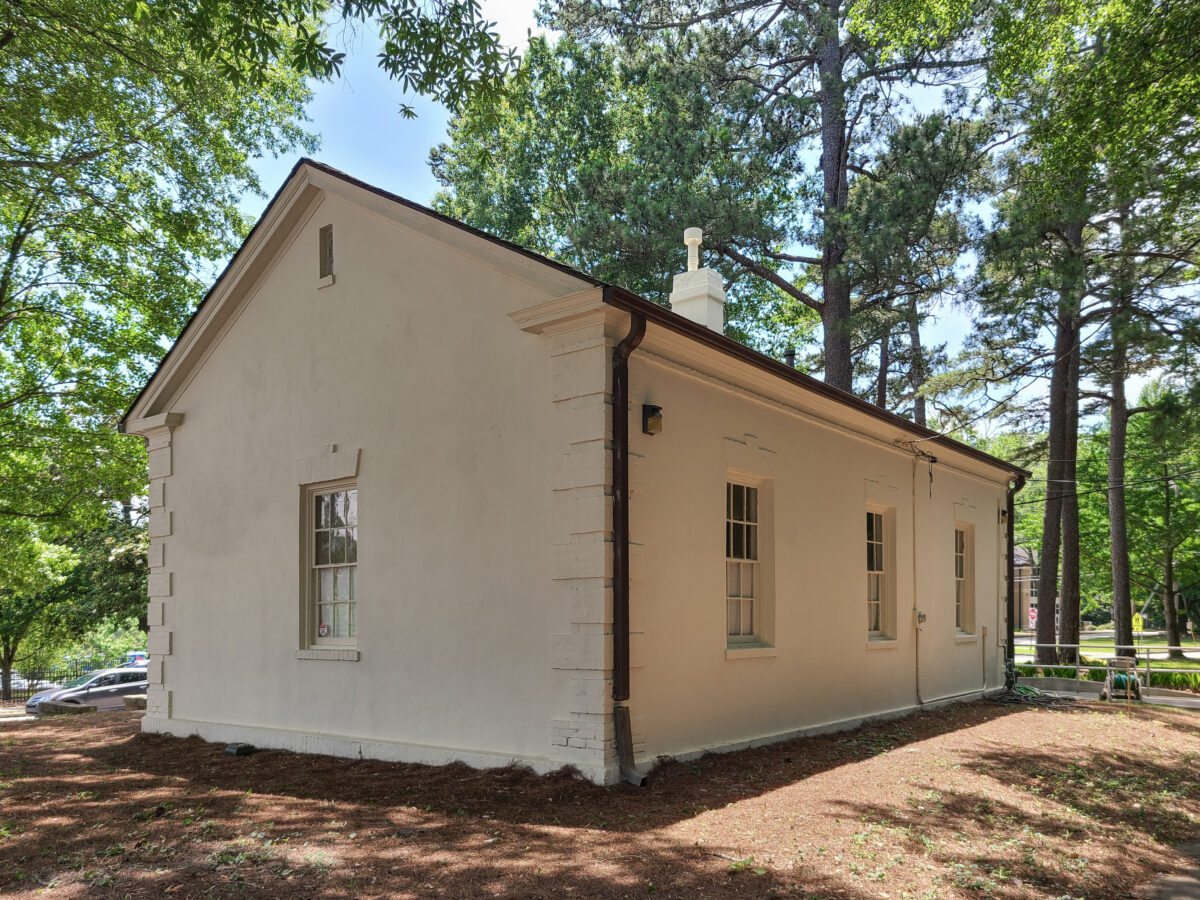
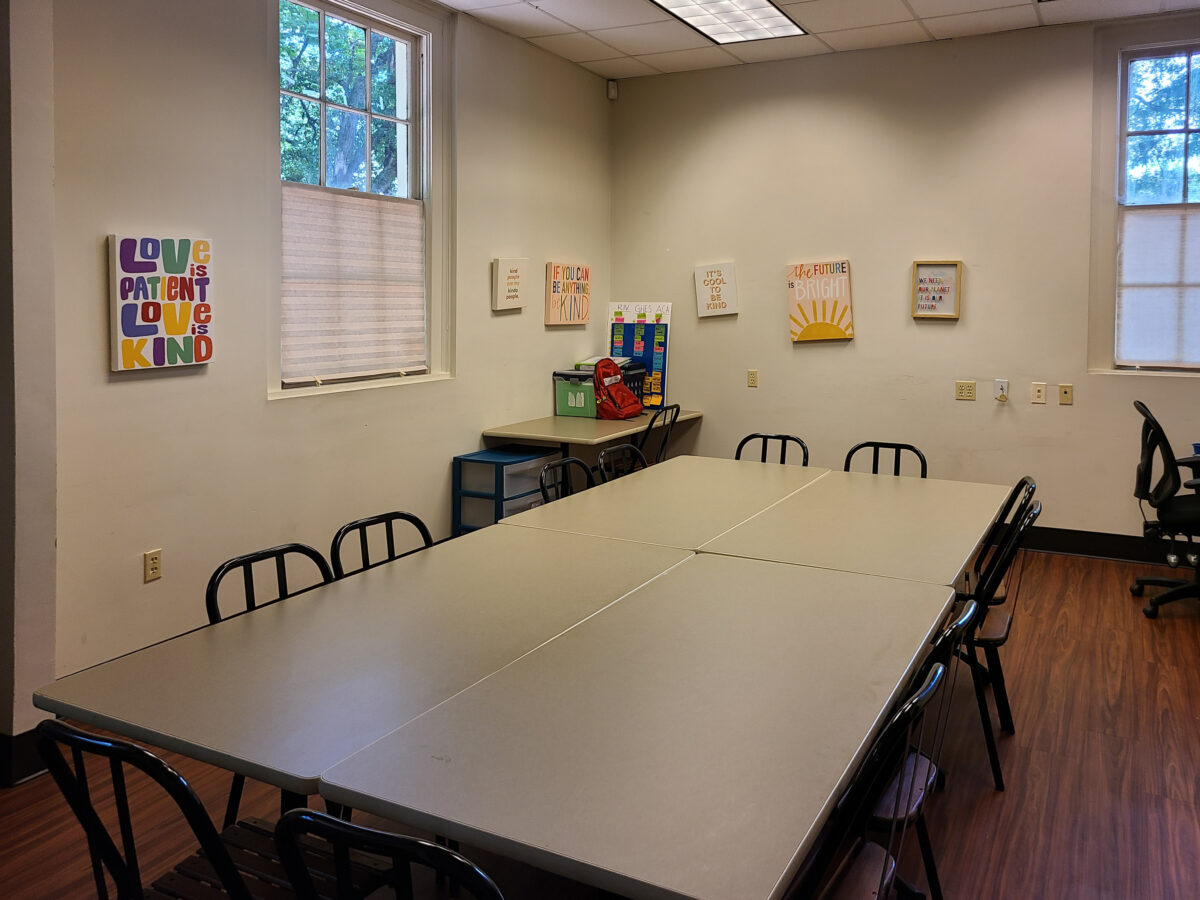
Dating to around 1909, the building at 2548 Peachtree Battle, next to APS’s E. River Elementary School, is known by a variety of names reflecting its long history, including the Bloodworth Kindergarten and the Little White House. School namesake Eretus Rivers built it – with a design by a famous New York firm – as a sales office for a new subdivision called Peachtree Heights Park – today’s Peachtree Heights West. It then passed into decades of other uses, including the kindergarten and a Daughters of the American Revolution (DAR) facility. Around 1930, it was donated to Fulton County – later passing to the City of Atlanta and then APS – with a deed restriction requiring public uses.
Today, the Lodge is occupied by the offices of an afterschool and summer school program called Kiddos Atlanta that, according to its program director, is planning to move out due to APS’s sales plan. APS did not respond to a comment request, but is embracing a new “historic inventory,” expected to be adopted later this year as part of the district’s strategic plan, that emphasizes preserving such buildings.
That system, created by the Atlanta Preservation Center (APC) after previous controversies over sales of former school buildings, spotlights the Lodge as one of APS’s most historically significant buildings. However, its initial assessment also emphasizes the reuse challenges of a small building sitting on what amounts to an oversized traffic island within Peachtree Battle Avenue.
“The most obvious use would be for it to be returned to the neighborhood or the City for use as a park, clubhouse or other such purpose,” wrote APC intern Ben Schmidt in the historic inventory assessment. “With the size of the lot and its awkward location, this is close to the largest building possible [on the site], and educational or daycare use is questionable with traffic speeding past right outside the door.”
On the other hand, the roughly three-year occupancy of Kiddos Atlanta shows the viability of ongoing use. Laura Dobson, a Buckhead resident and preservationist who advocated the successful partial preservation of the former National Book Bindery Company building just up the road, says the Lodge could be a similar “beacon for historic preservation.”
“It could operate as a museum with classes and events,” says Dobson. “It could come alive again. It’s small enough to keep. And big enough to use. And hopefully it will be enjoyed for many years to come.”
The Peachtree Battle Alliance (PBA), the civic association for the historic neighborhoods in the area, is also concerned.
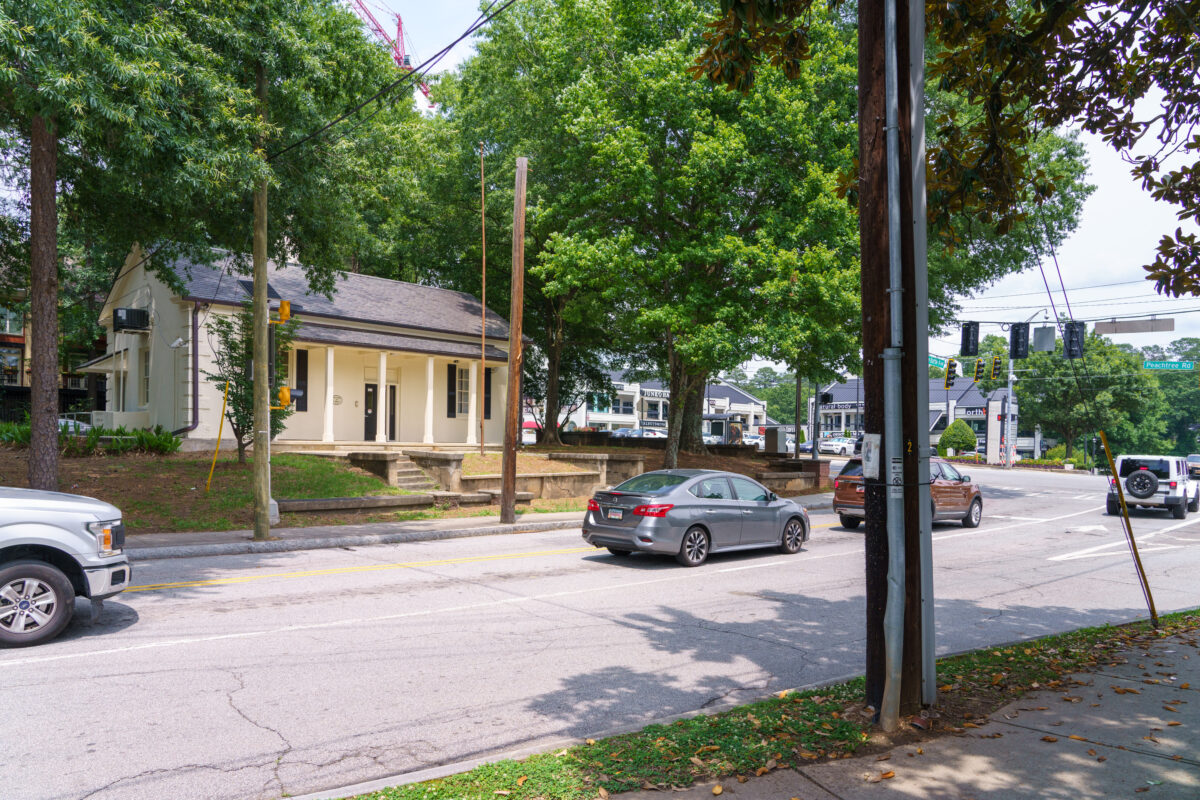
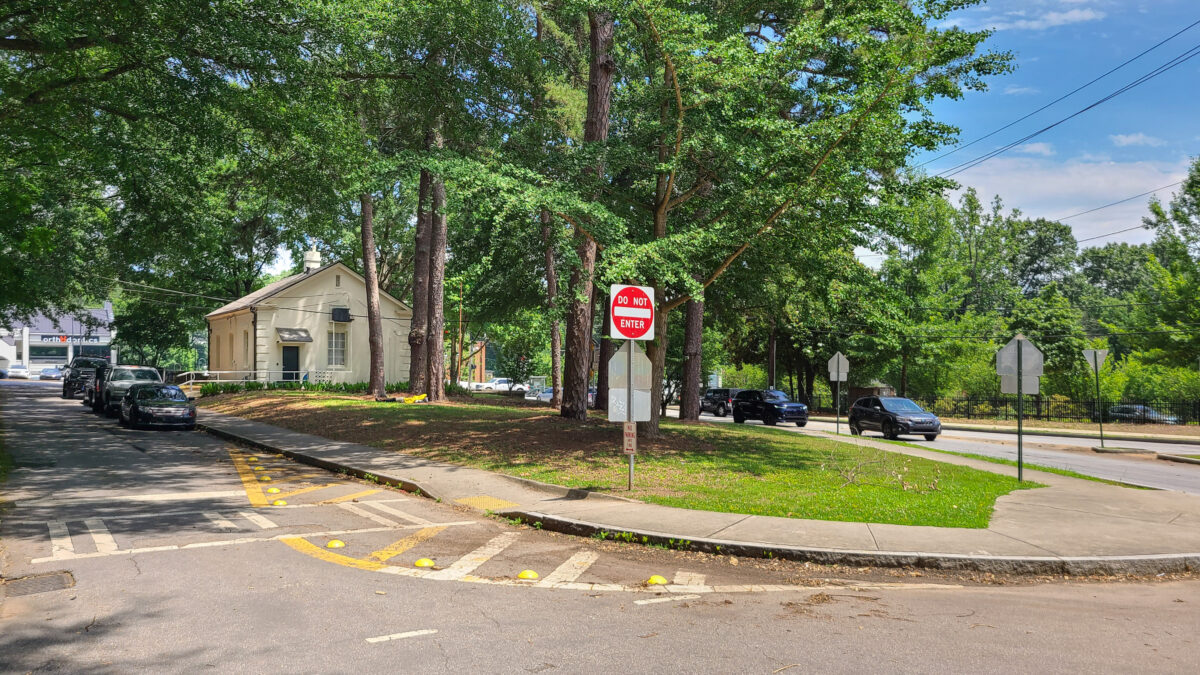
“Some creative thought around the future use of the building is needed,” says Kendra Adams, PBA’s co-president and communications chair. “That said, there are some opportunities and PBA definitely wants to be part of the conversation since [the Lodge] is the most significant entry point of our historic neighborhood.”
There’s a sense of urgency, as APS added the Lodge to its surplus list in recent months without local notice and recently repainted the structure. Kiddos Atlanta is planning to move its office to Northside Drive Baptist Church, where it also runs a program, according to programs manager Chay Westbrook.
Two Buckhead Heritage leaders – founder Wright Mitchell and board executive committee member John Beach – recently visited the property. According to Westbrook, they discussed interest in buying the Lodge, which organization officials would neither confirm nor deny.
“Our primary goal is to save the building for some compatible use for the community,” said Beach in response to questions about Buckhead Heritage’s possible purchase. “And that’s really what we want to focus on.”
Board president Charlotte Margolin also would not directly comment on the potential interest in buying the building. But she noted another Rivers legacy in her neighborhood of Peachtree Heights East, on the other side of Peachtree Road. Rivers was involved in that development as well, and after his death, his wife deeded land to the neighborhood for common green space. Today, that’s the Duck Pond, a privately run community jewel.
Margolin said that Buckhead Heritage’s focus is making sure the public-use intent of the Lodge’s deed restrictions are followed. “It’s really important to honor folks who donate and follow their instructions,” she said.
The Lodge has a rich cultural and architectural history that, at the least, probably makes it a candidate for listing on the National Register of Historic Places, according to the APS historic inventory report.
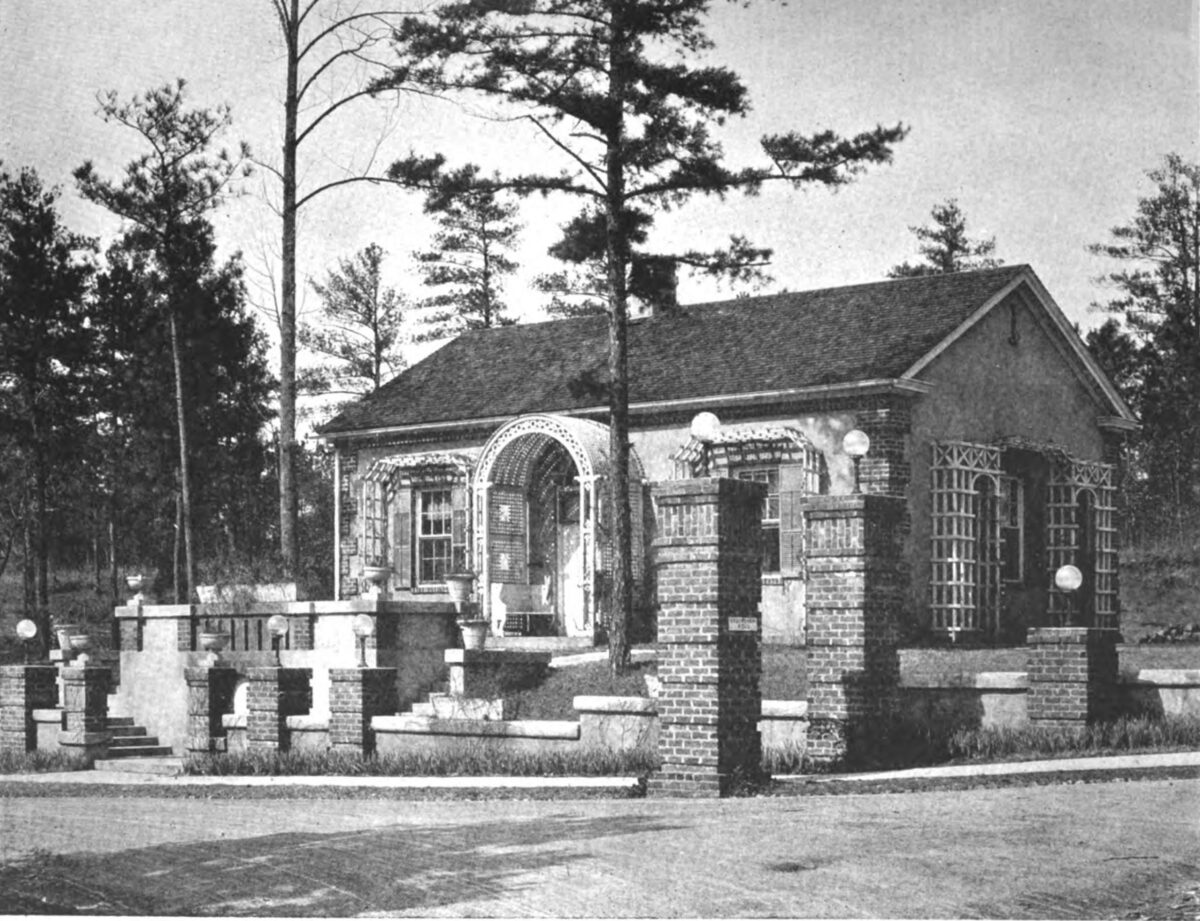
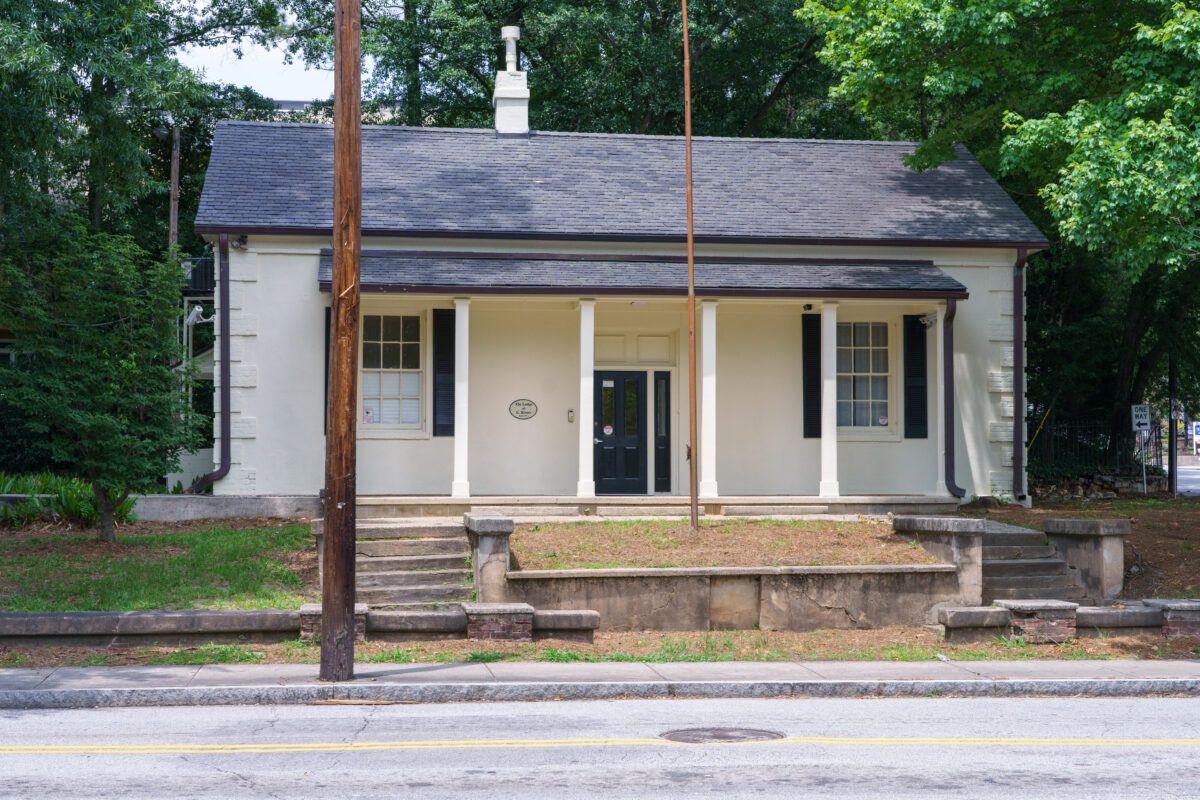
Its architects were the firm Carrère & Hastings, which also was involved in the overall Peachtree Heights Park plan. The New York City-based firm designed several iconic buildings, including the main branch of the New York Public Library and the Russell Senate Office Building in Washington, D.C. The Lodge was featured in a 1913 issue of the magazine “American Architect.” The core building is largely the same as in the photos, though arbors around the door and windows are gone and partly replaced at some point with a columned porch. Only partly intact today are lamp-topped brick pillars flanking the entrance.
The cultural significance starts with the Lodge’s key role in the creation of an entire Buckhead neighborhood – today on the National Register as the Peachtree Heights Park Historic District – from the former Collier estate. Rivers’ E. Rivers Realty Company played a role, along with such entities as the Peachtree Park Heights Company, in the plan and its land sales. Planning began in 1906, with the first lots sold in 1911.
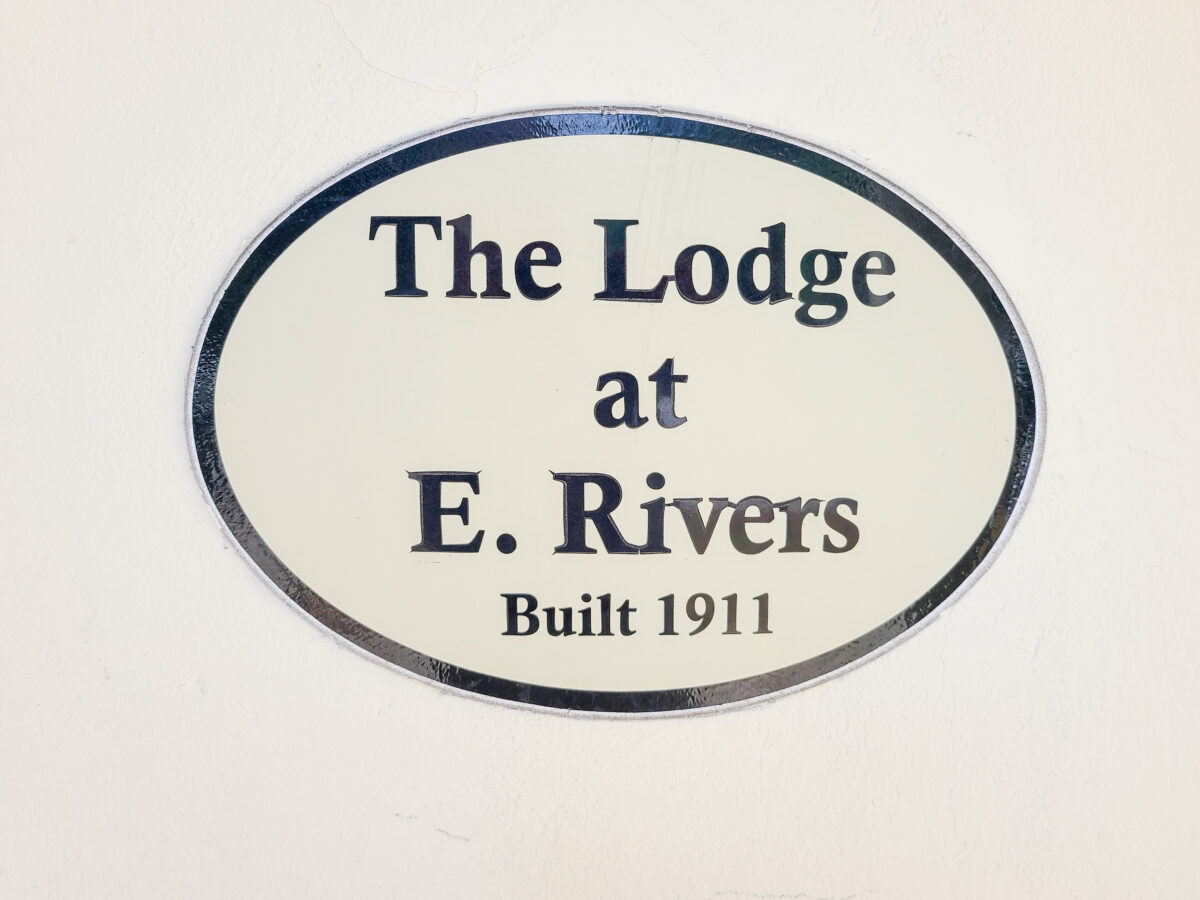
Rivers – who at one point served on the Atlanta Board of Education – also donated the land across the street for what is now E. Rivers Elementary. It opened in 1917 as the Peachtree Heights School, with the renaming for Rivers in 1926. The original school burned in 1948, but its 1950 replacement is itself significant enough to make the top tier of buildings worth preserving in the APS historic inventory report. Others in Buckhead include Garden Hills Elementary and Atlanta International School in the former North Fulton High.
Public uses of the Lodge began in June 1911, when a local DAR chapter took over and hosted public events.
Another locally significant use was Mary Hardwick Bloodsworth’s private kindergarten, which operated from 1930 to around 1950. According to a recent Northside Neighbor column by Kennedy, Bloodworth began teaching children in a neighbor’s Druid Hills home after her husband died. Beach says Rivers offered the Lodge to Bloodworth’s booming kindergarten in late 1929. Beach suspects the infamous stock market crash roughly a month earlier played into Rivers’ decision to get the school tenant.
The kindergarten was not a part of the Atlanta school system, but many of its students attended E. Rivers Elementary. Bloodworth retired about two years before her death in 1952, according to Kennedy.
During those school years, in 1937, the Peachtree Heights Park Company essentially donated the land for $1 to Fulton County. Until that time, according to Beach, the Lodge site was not a separate property, but rather part of the common land of the subdivision owned by the company.
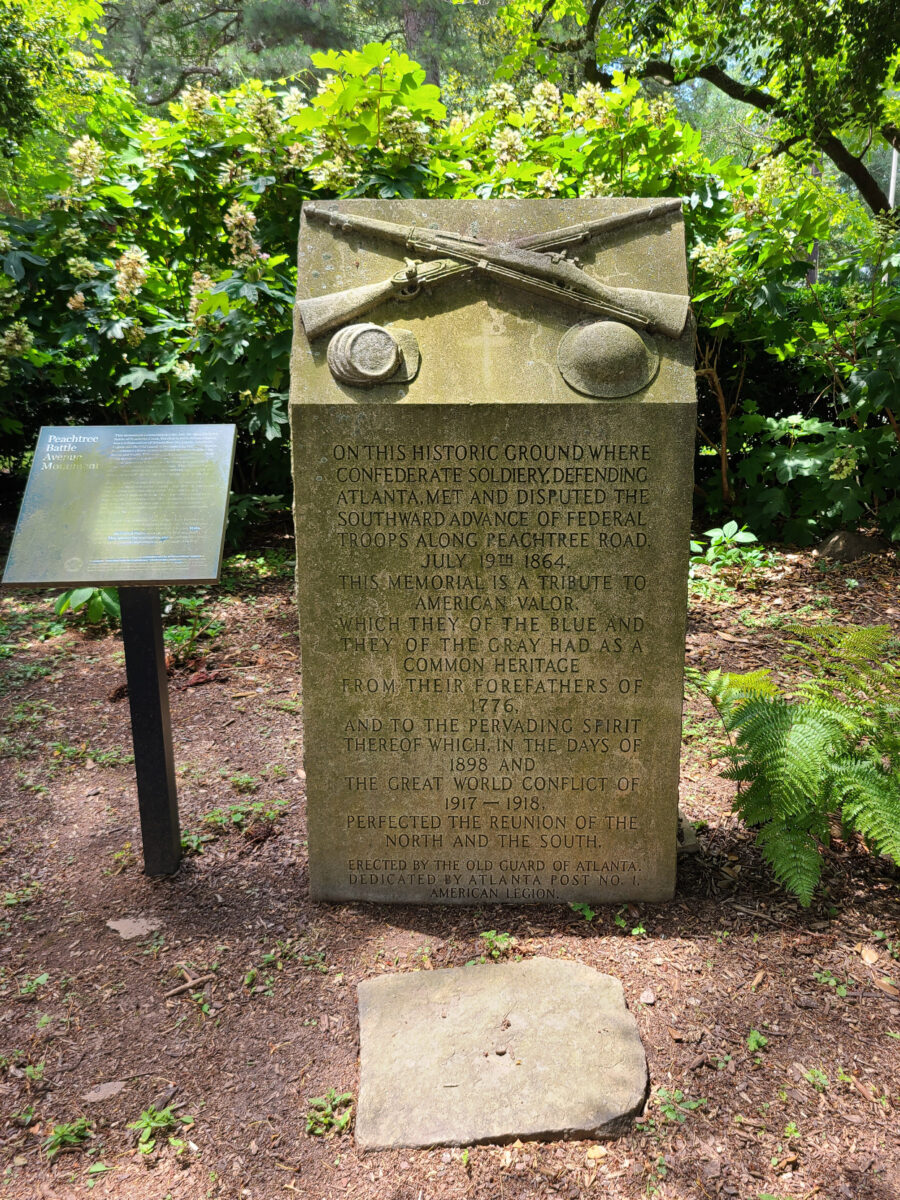
The donation tied into yet another piece of local history that did not come to fruition, according to Beach: a grand plan for a Civil War memorial park stretching from the Kennesaw battlefield to Stone Mountain, site of a notorious Confederate monument. The park pathway would have run through Buckhead. As the name of Peachtree Battle Avenue suggests, the Civil War Battle of Peachtree Creek – a key part of the battle for Atlanta – was fought in the area.
Today, the nearby Atlanta Memorial Park is a surviving part of that battlefield. But the original park plan included a green space of donated land that still exists in a median along Peachtree Battle Avenue between Peachtree Road and Dellwood Drive. (The rest of the street is undivided in part because another developer took back donated land after the park plan’s failure.)
In 1935, a Confederate veterans group erected a Civil War memorial that still stands in the median in front of E. Rivers Elementary, about 250 feet west of the Lodge. Other developers in the area donated property for the plan, according to Beach, who says the family of Rivers – who died in 1932 – probably were involved in the Lodge donation idea.
Beach says it’s unclear if the 1937 donation of the Lodge site to the County was intended to be permanent or temporary. Regardless, a deed restriction that came with the deal remains in effect – including through later transfer of the land to the City and, in 2018, to APS.
That restriction says the property “shall be used only for museum, monumental, educational, park or other like purpose, except that the County is authorized to use a part of said property for widening one or more of the surrounding roads or avenues, and upon failure of the county to use said property for any one of the above purposes the same shall revert to grantor or its assigns.”
That deed restriction, as well as the unusual location, may be both bane and boon for viable reuses of the historic structure. Buckhead Heritage said in its statement that it is reaching out to Board of Education and Atlanta City Council members for more information about possible preservation.
“We will remain actively involved in the preservation efforts for The Lodge and advocate for its recognition as an important cultural asset that contributes to the unique character of the neighborhood,” the group said.
“It’s literally where the neighborhoods of Peachtree Battle began,” said Dobson of the Lodge. “… These small buildings can be taken for granted in a world where bigger is better. But they are so important to the depth of a community. If they are saved, if they continue to be loved, they can continue to make memories.”
Tech billionaire Tope Awotona, founder of the scheduling software company Calendly, is preparing to settle into Buckhead with a new West Paces Ferry Road home under construction. The home is so large that two lots were purchased to accommodate it.
Awotona – who did not respond to an interview request – is among the neighborhood’s several billionaires, including Spanx clothing founder Sara Blakely and Mailchimp creator Ben Chestnut.
Awotona made Forbes magazine’s list of billionaires at age 40 this year, with Calendly’s estimated value at $3 billion less than a decade after he launched it with the help of Buckhead’s Atlanta Tech Village. When Calendly had reached a viable product, Buckhead investor David Cummings stepped in with a $550,000 seed round that later took off.
He was born in Lagos, Nigeria to an entrepreneurial family, according to an Inc.com profile: his grandmother had a textile business, his mother and aunt co-owned a pharmacy, and his father left a corporate job to start several businesses. When he was 12, his father was shot to death in a carjacking, in front of him. “There was a part of me, from a very early age, that wanted to redeem him,” he once said told Forbes. The family left Nigeria for Marietta Georgia in 1996, when was 15.
Awotona was precocious, graduating high school two years earlier and accepted into college at age 15, though his mother would not allow him to attend at that time. He went on to graduate from the University of Georgia and went into software sales.
But the startup urge had a hold on him, and he launched a string of unsuccessful businesses: a dating site and ecommerce sites for projectors and yard equipment.
In 2012, while attempting to schedule a meeting, Awotona realized there was not a good product for doing so smoothly and quickly. That gave him the brainstorm for Calendly, which he launched in September 2013 and soon brought to Atlanta Tech Village, a startup incubator on Piedmont Road in Buckhead, which helped him to secure funding.
Today, the business remains based in Atlanta, though it has no physical office, with everyone working remotely as of last year. Forbes estimates it has 10 million users in a rapidly growing base. Awotona remains the majority owner and works as CEO.
The spectacular success of Calendly has made Awotona wealthy – but one of only two Black tech billionaires in the U.S., by Forbes’ count.
“Your background is what you make of it. It can be an asset or an excuse,” he told Tech Village in a 2018 interview. “I have never accepted lowered standards. Where I grew up, everyone looked like me – all of our leaders were Black, so color didn’t set any limits to my dreaming. But I have learned that growing up Black in America is very different. There are not nearly enough examples of people who look like us in positions of power or who have a lot of success in the tech field. Unfortunately, that limits people and can hinder the idea that they can do whatever they want.” Now, Tope Awotona is a role model to others that shows what is possible, regardless of race.
According to Calendly and various media profiles, Awotona also maintains a residence in New York City and enjoys standup comedy, CrossFit exercise and meditation.
A 20-story apartment tower may rise behind Buckhead’s Restoration Hardware furnishings store.
M Development’s proposed 289-unit tower would replace a two-story parking garage behind the 3030 Peachtree Road store, which would remain untouched. The tower is using that same street address, but would stand on two private roads: one known as the Pharr Road Connector and the other a private extension of the otherwise public Buckhead Avenue.
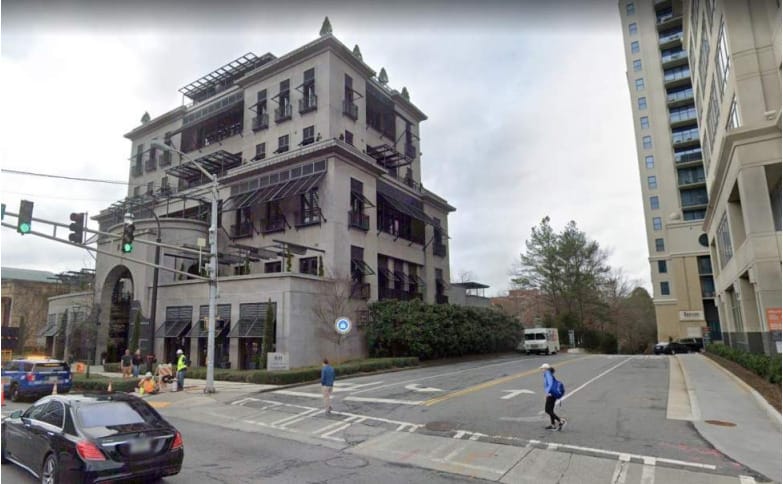

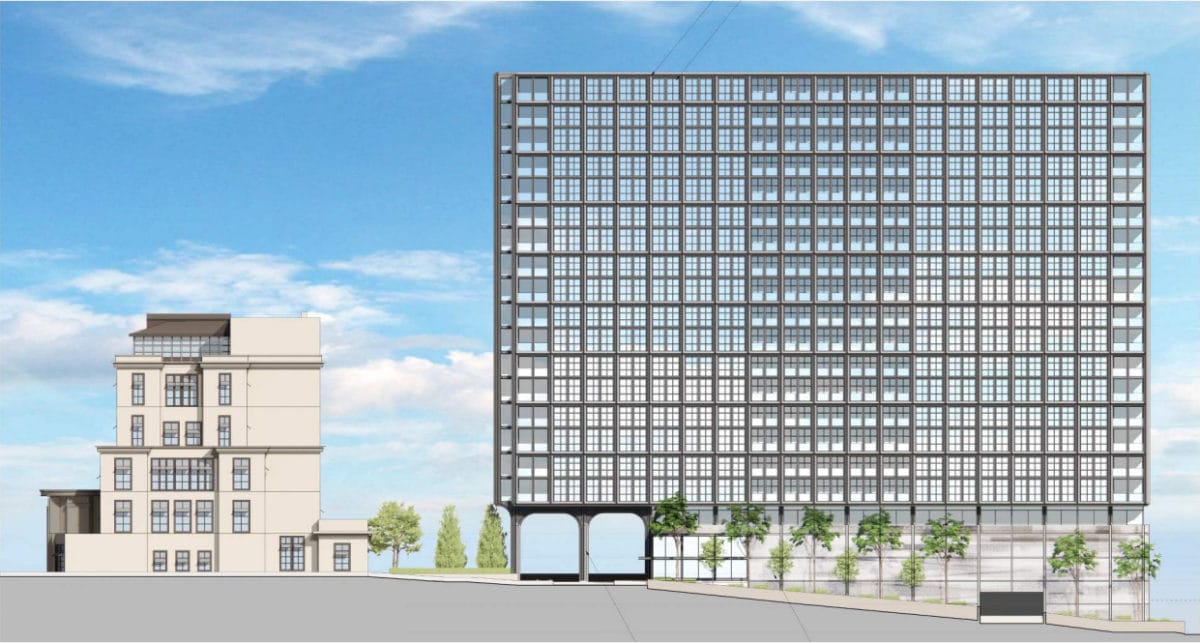
At just under 225 feet tall, the tower would add another highrise to the border area of Peachtree Heights West and Buckhead Village, which includes the adjacent Buckhead Plaza complex. A mixed-use tower complex is in the planning stage about a block away on West Paces Ferry Road.
Developer representatives presented the project at a May 4 meeting of the Development Review Committee (DRC) of Special Public Interest District 9 (SPI-9), a special zoning area focused on design and sustainability. They said the project needs no zoning variations, but requires a special administrative permit (SAP). DRC members suggested such improvements as more bicycle parking, dog amenities, and units made affordable to middle-income people.
“We need to be able to get our workforce living in the community,” said DRC chair Denise Starling. “So if that is something you can figure out a way to do … we’d love for you to consider it.”
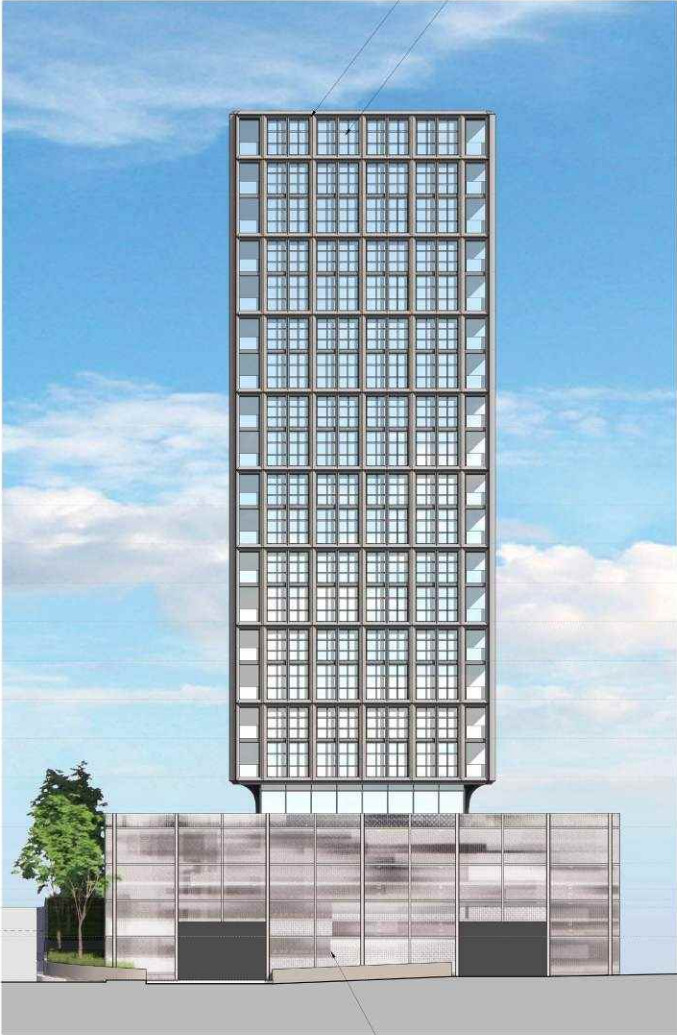
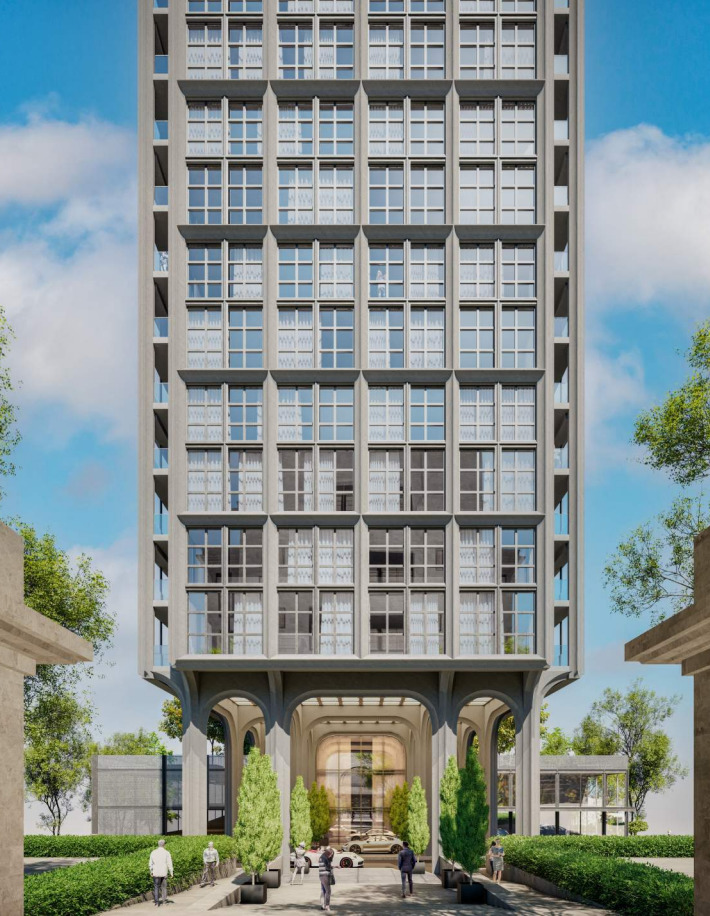
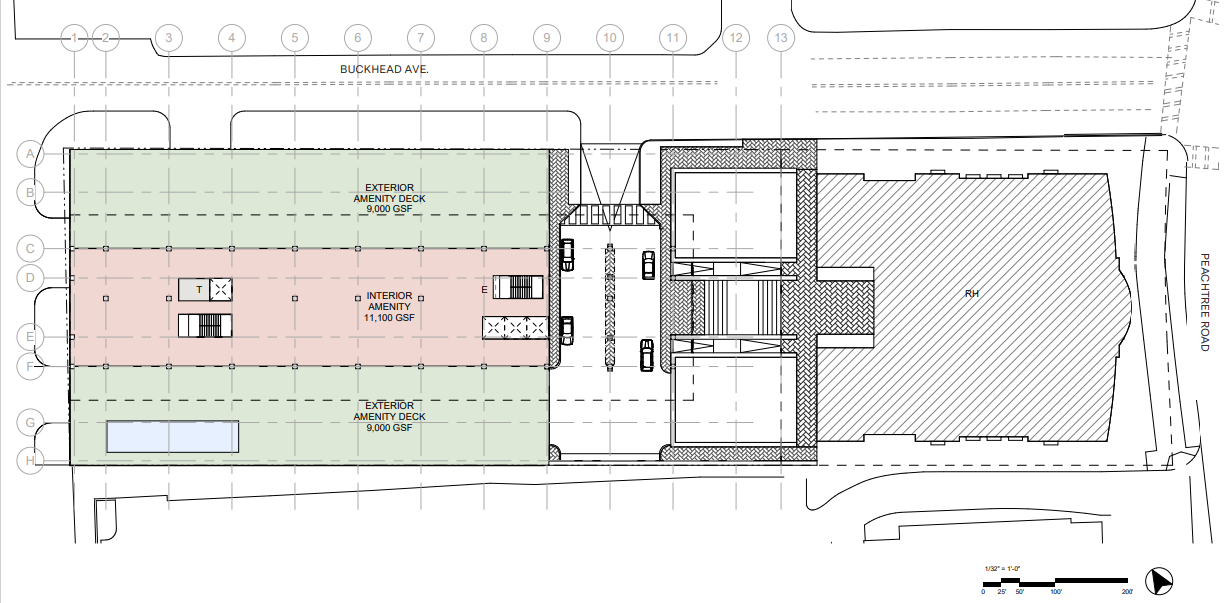
The tower would have two outdoor “amenity decks” on its third story and a drop-off driveway shared with the store that would stand under a two-story portico. Renovations to the store’s outdoor showrooms are included in the plan.
The residential unit breakdown is 170 one-bedrooms, 68 two-bedrooms and 51 three-bedrooms. Many units would have balconies.
A new parking garage under the tower would have 478 spaces – 408 for the apartments and 70 for the store. The project has no minimum parking requirement, according to documents filed with the City. The plan includes 46 bicycle parking spaces, which is the minimum required, according to the plans.
The store’s current driveway is on Buckhead Avenue and is aligned with that of Buckhead Plaza. The plan calls for moving that main entrance farther down Buckhead Avenue and using other entrances and exits on both of the private streets. A loading area would be accessed from the Pharr Road Connector as well. Those changes to easements on the private streets are being reviewed in concert with Buckhead Plaza, according to project attorney Carl Westmoreland.
The developer intends to subdivide the property, separating the store and the tower, as part of the development process, but the plan meets all zoning requirements either way, Westmoreland said.
He said the developer may file for the SAP as soon as next week and then seek permits to begin construction.
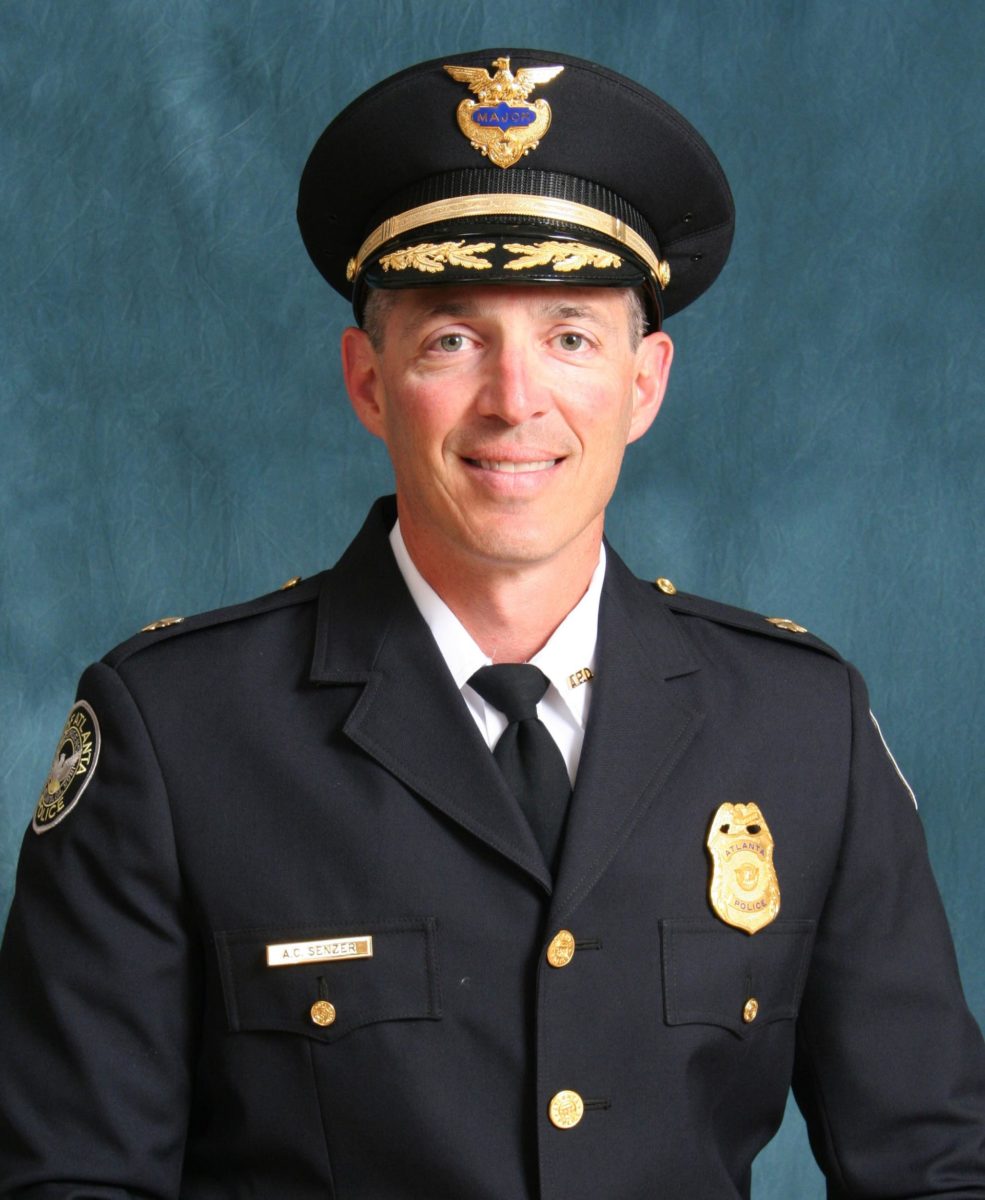
Buckhead’s Atlanta Police Department precinct is seeing a changing of the guard as its current commander has received a promotion to deputy chief.
Andrew Senzer, who has led the Zone 2 precinct since November 2019 with the rank of major, will head APD’s Strategy and Special Projects Division, he announced at an April 7 meeting of the Buckhead Public Safety Task Force.
Major Ailen Mitchell, who has served as Senzer’s assistant since 2020, will be the new Zone 2 commander, Deputy Chief Timothy Peek said in the meeting.
The transition will happen on April 14, according to APD. The current head of the Strategy and Special Projects Division, Deputy Chief Darin Schierbaum, is being promoted to the vacant position of assistant chief of police.
Senzer was Buckhead’s police commander through the historic COVID-19 pandemic and accompanying crime spike, including the May 2020 rioting and looting in local business areas that spun out of Black Lives Matter protests about the Minneapolis police murder of George Floyd.
He also led through the beginning of the Buckhead cityhood movement that based itself on crime concerns. While crime spiked, Senzer took a zero-tolerance approach and Buckhead continues to have the city’s lowest crime rate.
“It really has been an honor to serve as the commander of Zone 2,” Senzer said in the task force meeting. “In my 26 years [in policing], this has probably been the most challenging assignment I’ve had.”
He said his new role will be “a little behind the scenes” but that he will “not be a stranger” in Buckhead.
Peek said APD is “ecstatic” about Senzer taking on the deputy chief role.
Mitchell, according to his APD biography, has been with the department since 2006. He previously commanded the SWAT team and, like Senzer, once served on the Red Dog unit, an anti-drug squad disbanded in 2011 after controversial incidents like an illegal raid on the Atlanta Eagle gay bar. Among his other work was the Gang Unit and the Auto Theft Task Force.
Mitchell became Zone 2’s Criminal Investigations Unit commander in 2018 and its assistant commander in 2020.
Zone 2 is headquartered at 3120 Maple Drive in Buckhead Village.
Update: This story has been updated with information from APD about the transition.
From last year’s attack on the U.S. Capitol to the ongoing invasion of Ukraine, it’s a tough time for democracy.
Then again, it always has been. The United States, the world’s leading light of democracy, has often failed to live up to its own ideals and has faced major threats from within and from other nations alike. The founders fretted constantly about the survival of a democracy that, come 2026, will celebrate its 250th year since the Declaration of Independence.
The Buckhead-based Atlanta History Center is co-founder of a national effort to not only celebrate that big birthday, but also to engage communities in the meaning and practice of democracy. A kickoff exhibit that you can catch through March 23 is just the start of multi-year local programs that also marks another 2026 anniversary: the center’s own centennial.
“The idea is, we’ve never been perfect, it’s always been hard, and people have always had to work at it,” says Sheffield Hale, the center’s president and CEO, reflecting on American democracy. “And you can be either a part of the solution or let somebody do it for you or do it to you.”
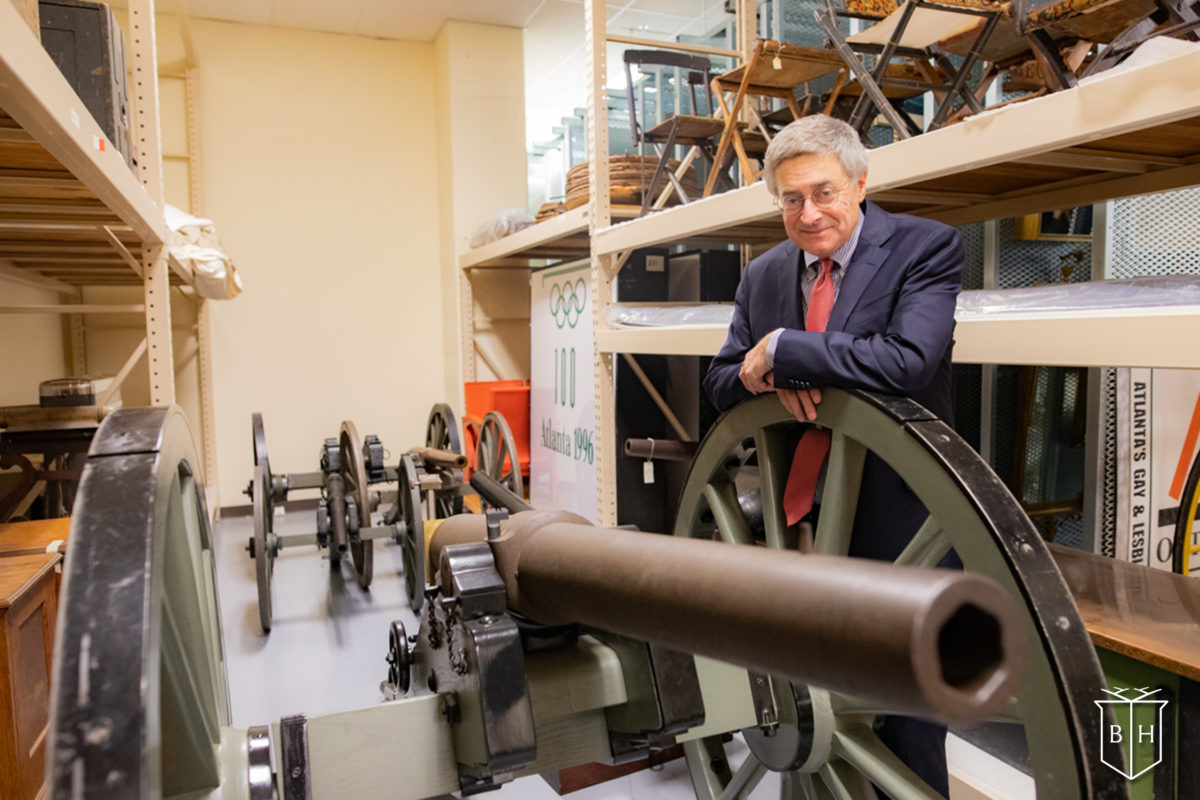
Since November, the center has hosted “American Democracy: A Great Leap of Faith,” a touring exhibit from the Smithsonian Institution that is customized with local artifacts. The center has paired that with community discussions and other events related to voting, civil rights and “community leadership” that Hale says is one outgrowth of America’s democratic culture.
But that was just the beginning of a five-year program leading up to the 250th, some in the works and some yet to be determined. Locally, the center already has scheduled a “Civic Season” program this spring and summer, focused on Juneteenth, the celebration of the emancipation of enslaved African American people in the U.S., and the country’s birthday on the Fourth of July.
“‘Civic Season’ is between those two anchors, and how they related to each other and don’t relate, and [how] people have different relationships and points of view about both of those holidays,” said Hale.
The center is playing a key role in a much larger effort of more than 100 affiliated history museums and organizations around the country, under the banner of a nonprofit called Made By Us. The group exists solely to crafts programs related to the country’s 250th birthday, or “semiquincentennial.” The center is on the steering committee, along with the National Archives Foundation and museums in Detroit, Pittsburgh, Miami, Missouri, New York, Oklahoma and Virginia.
Made By Us is still working on programming ideas, but Hale expects them to be deeper and more nuanced than the nation’s bicentennial celebration of 1976.
“I think what we saw in the bicentennial was just celebration, which was great. We certainly needed it. We certainly need it now,” he said. “But I think now it’s going to be more reflection and understanding in addition to the celebration.”
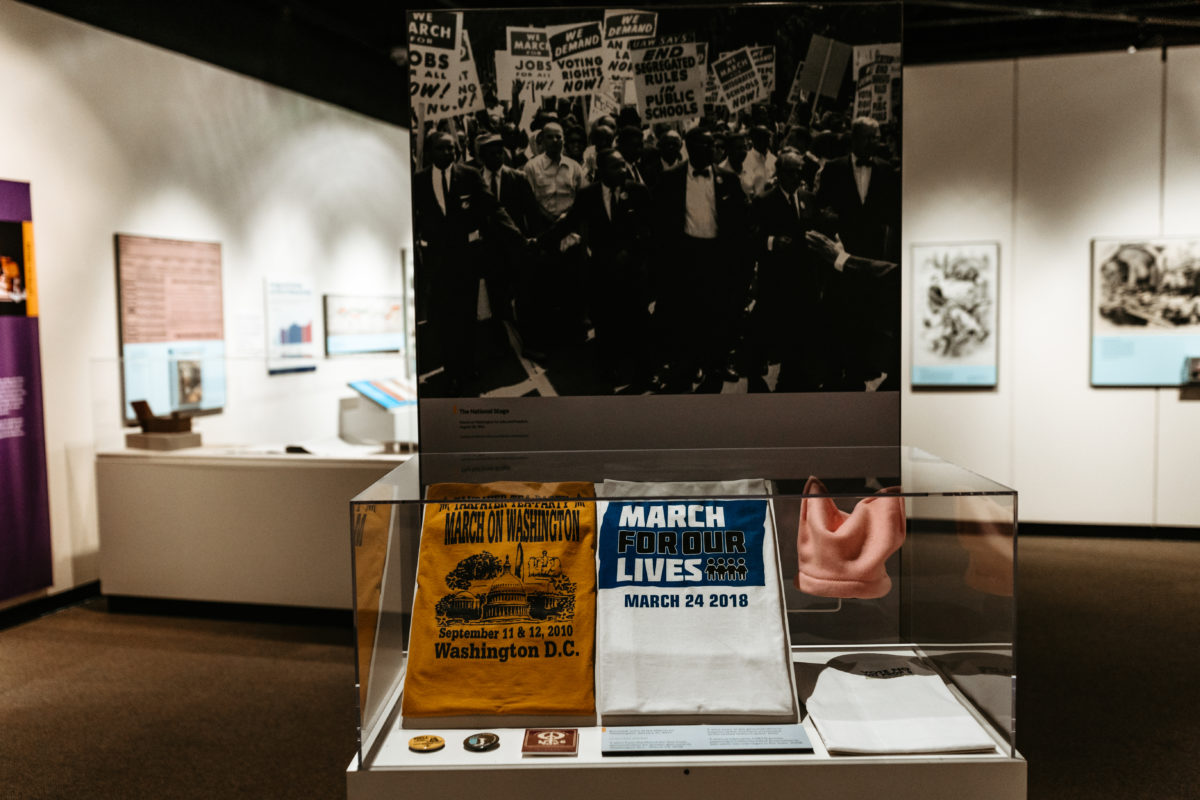
That includes acknowledging a democracy that often failed to include everyone, up to and including the atrocities of slavery. The approach may also mean adding notes of fragility, Hale says, to marking “250 years of a democracy that a lot of people — at the time and since — thought wouldn’t survive.”
For Made by Us, Hale says, “The target audience is 18 to 30 for this group, and it’s about civic engagement and what you can do — what is your vision for America?”
At the local level, the center is already focusing its programming on “building community” — meaning gathering people to discuss a book or civic topic, like voting rights and citizenship, to bridge differences and learn about ways to join community groups. Part of the lesson about democracy, Hale says, is “that you can participate in all kinds of ways, and it’s not just voting.” And maybe most important to “frankly, not take it for granted.”
“We like to say we’re talking more about methodology than ideology,” Hale said. “This is not a right-versus-left or blue-versus-red issue. It’s an American issue.”
As a museum, the center’s role is to “bring the facts to the table,” says Hale. But of course, history is rarely that simple or apolitical. “There’s never been an agreement on what our history was and is and what it means,” Hale acknowledges.
But the center also offers the “lens of history” — an opportunity to look back at successes, failures and mixtures of both long past without “being inflamed by the current moment,” as Hale puts it. “That’s one way you can approach history and sort of get past the partisan entrenchments people have.”
The real challenge for exhibit-creators is the substance. “How do you explain to people the genius of this democracy and the fact that it can be improved and has been, structurally and otherwise?” asks Hale.
And in particular, how to do that in a time when people may feel despondent or cynical in a time when fundamental institutions are being questions, from the Capitol attack to talk of packing the U.S. Supreme Court. History, as always, offers the opportunity for perspective.
“Things have been worse. We had a civil war,” says Hale. “Don’t wring your hands and say, ‘What am I going to do?’ Just do it. It’s there for you to do.”
For more about the “American Democracy” exhibit and other current and future programming, see the center’s website at atlantahistorycenter.com.
Sam Massell, the former Atlanta mayor who became a champion of his adopted neighborhood of Buckhead, is being remembered as a transformative and visionary leader following his death at age 94.
Massell, who died March 13, was a longtime resident of Peachtree Heights West. He was well-known for serving as mayor in 1970-74 and his hand in establishing MARTA. Locally he was highly influential in the business and philanthropic communities as a founder of the Buckhead Community Improvement District and original president of the Buckhead Coalition.
“Sam’s impact on our city was immeasurable,” said Mayor Andre Dickens in a written statement. “His time as mayor made history in so many ways.”
“His leadership in the city of Atlanta was transformative,” said Rabbi Peter Berg of The Temple, the Midtown synagogue where Massell was a member of the congregation and where his memorial service is scheduled for March 16.
“Sam had greatness,” said Charles McNair, the novelist and journalist who wrote “Play It Again, Sam,” a 2017 biography of Massell.
“Sam’s impact on our city was immeasurable. His time as mayor made history in so many ways.”
Atlanta Mayor Andre Dickens
Massell grew up in Druid Hills and had entrepreneurial careers in real estate and as a travel agent. He entered politics in the 1960s, serving as president of the Atlanta City Council (then the Board of Alderman). He then became Atlanta’s first, and still only, Jewish mayor, and worked to diversify City government. He lost a re-election bid to Atlanta’s first Black mayor, Maynard Jackson.
In 1988, Massell became the founding president of the Coalition, an invitation-only group of prominent civic and business leaders. He led the nonprofit organization in promoting various efforts related to public safety and charitable support. He also played a key role in the controversial extension of the Ga. 400 highway and related MARTA Red Line train system through Buckhead.
Under his leadership the Coalition also spun off the CID, a group of commercial property owners in the central business district who tax themselves to fund improvements to public safety, transportation and the streetscape. In later years, he proposed a program to address affordability of retail space for small businesses.
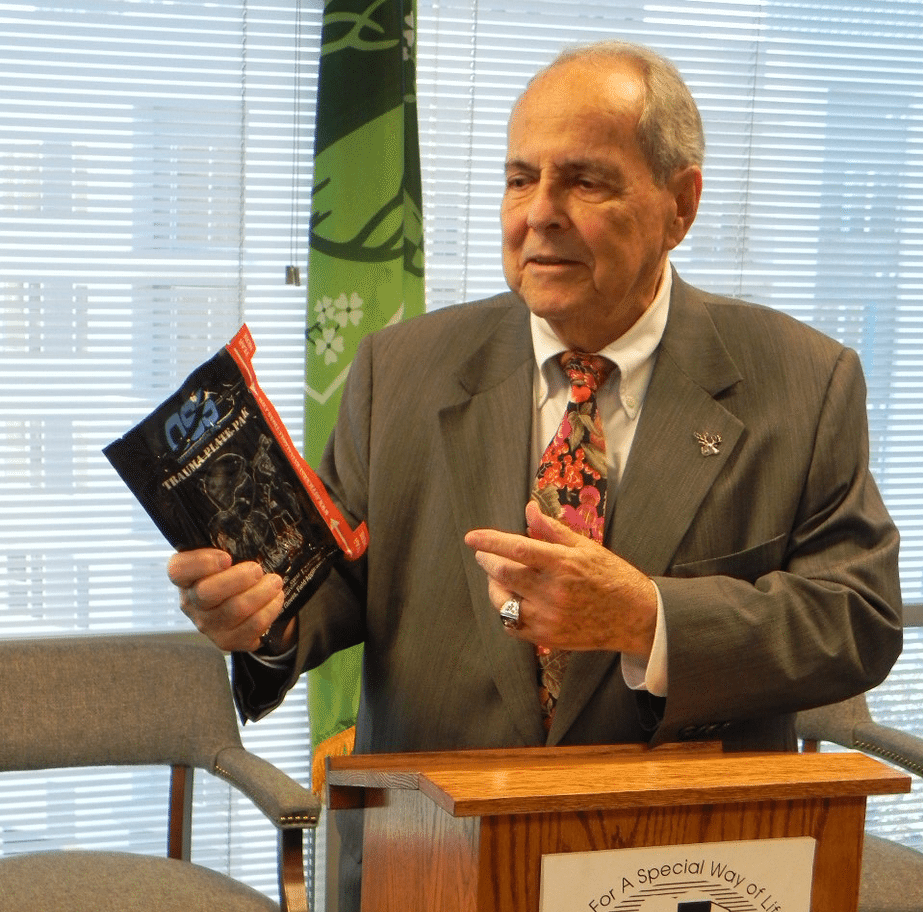
Massell continued citywide service, including on the organizing committee for the 1996 Summer Olympics in Atlanta. Andrew Young, the Civil Rights leader who served as mayor at that time, called Massell a “man and a half” in the introduction to “Play It Again, Sam,” adding, “The success of Buckhead that Sam has driven is a true benefit to the rest of us, no matter where in Atlanta we live.”
Locally, Massell became Buckhead’s biggest booster. As an informal economic development agency for the neighborhood, his Coalition published the “Buckhead Guidebook,” an annual magazine packed with minute details, from demographics to the location of public art. More whimsically, he oversaw the creation of a Buckhead flag and got a Georgia General Assembly passed giving the neighborhood unofficially official boundaries.
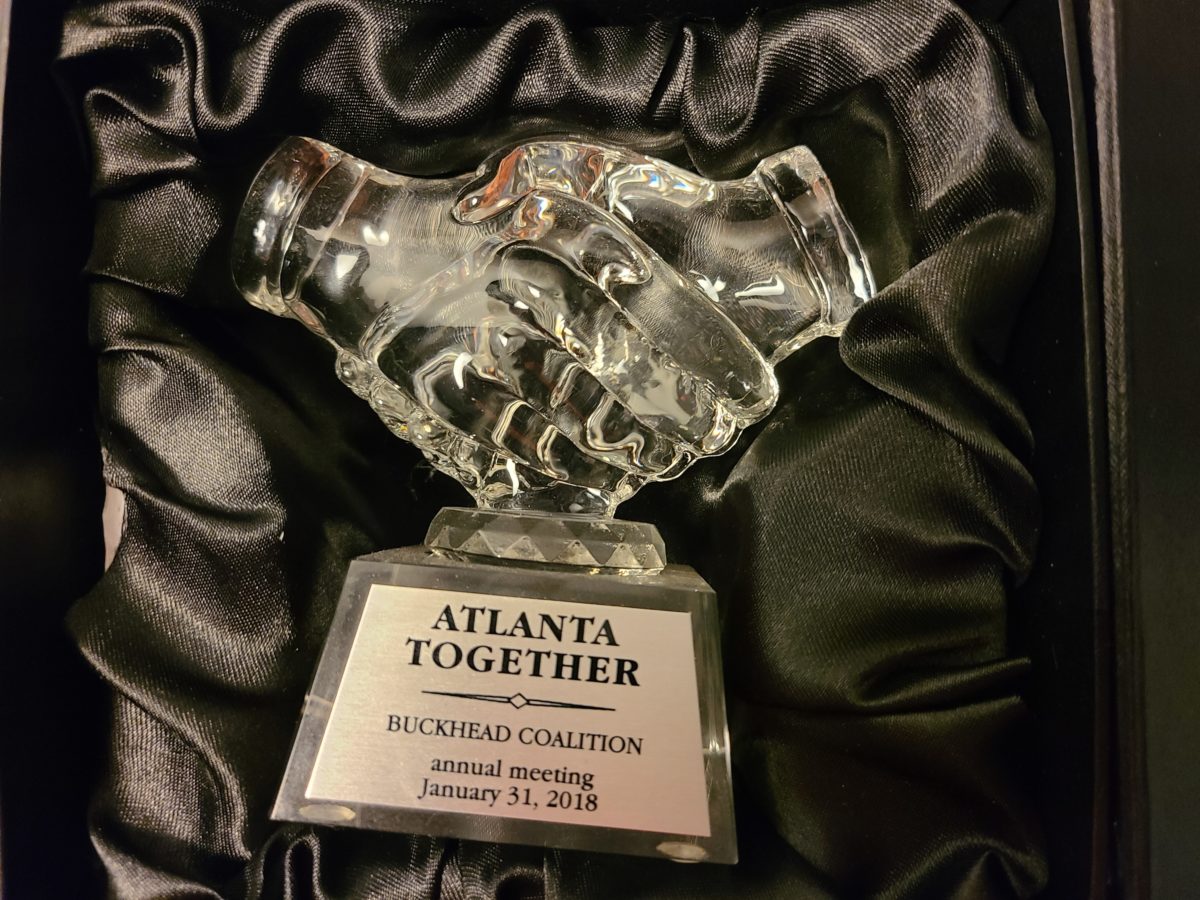
“Probably more than anything else, the Buckhead Coalition is credited with branding Buckhead,” Massell told Buckhead.com in a 2015 interview. “That has paid off economically, as a good brand affects everything. I imagine the future of Buckhead to be more of the same, protecting and preserving what we have.”
Massell became known as the unofficial “Mayor of Buckhead” — emphasis on “unofficial.” While a booster, Massell long cautioned against rumblings of Buckhead leaving Atlanta to become its own city, something he said would be disastrous and a violation of civic spirit. After the divisive 2017 mayoral election, where Keisha Lance Bottoms narrowly beat local resident Mary Norwood, Massell held unity events and, at the Coalition’s annual luncheon, handed out glass sculptures of a handshake bearing the phrase “Atlanta Together.”
When an unprecedentedly serious cityhood effort emerged in 2020, Massell was a main critic. In his final interview with this reporter late last year, he predicted an end to the cityhood effort but also a lingering battle. “I think its chances are nil, but still, you can’t take it for granted and we have to continue to oppose it and find the power that makes sense and represents a cross-section of Atlanta, because it affects all of Atlanta,” he said. “… The bad part is, it’s going to drag out for a couple of years.”
In person, Massell was a witty and charming raconteur who placed great emphasis on good manners — though he was a master of “bless your heart”-ing for those who crossed him or the neighborhood. As a Democratic former mayor shepherding a largely Republican group of leaders in 1980s Buckhead in the Coalition’s early days, Massell needed a great deal of charisma and had it a aplenty.
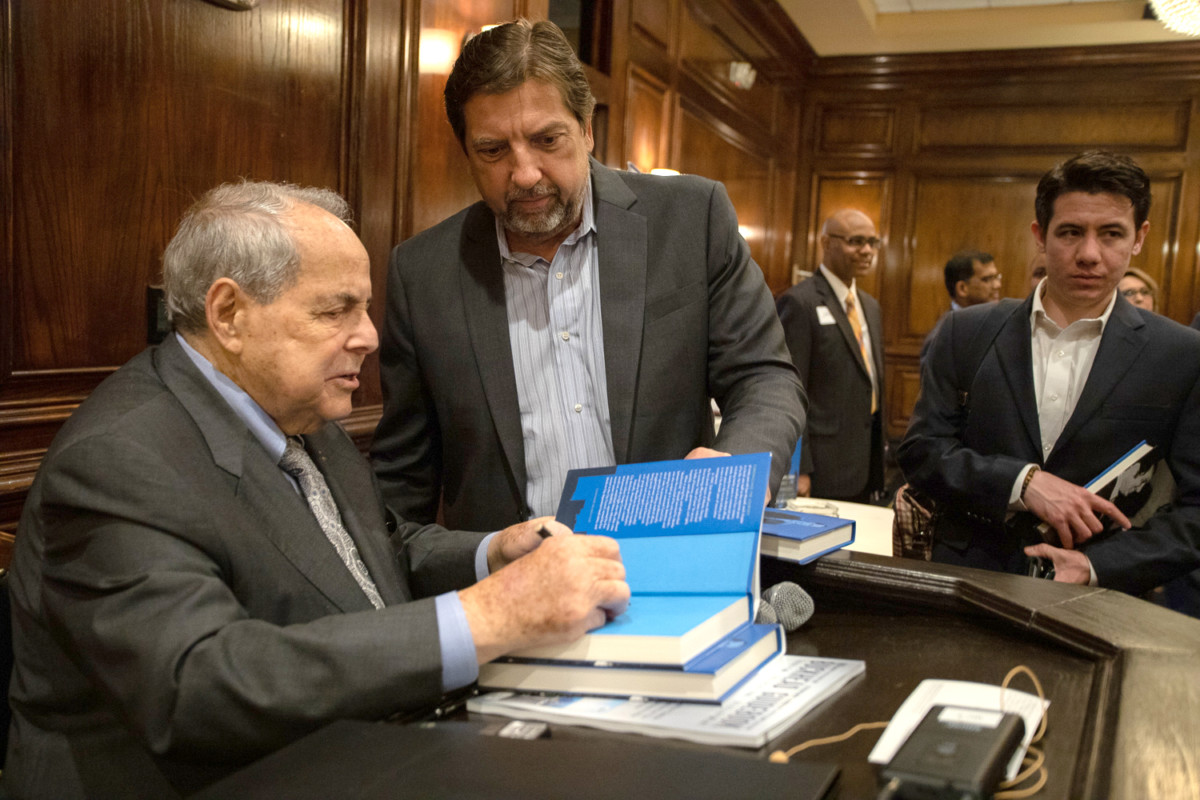
Massell also was adept at charming the press, as we at Buckhead.com saw first-hand, whether it was hosting our publisher for a sit-down in his trophy-filled office or answering a question about his background in amateur stage magic by making a Buckhead Coalition coin disappear — and reappear as a souvenir. More significantly, Massell saw the press as a vital community asset and valued its scrutiny. In recent years he touted a “Buckhead Triangle of Success” — an interrelationship between local business, local nonprofit organizations, and local media.
Massell retired from the Coalition in mid-2020 to enjoy life with his wife Sandra Gordy. The COVID-19 pandemic ended their plans to travel on cruises, but a late-afternoon cocktail hour remained a sacrosanct tradition as they enjoyed each other’s company.
Massell was preceded in death by his former wife Doris. Survivors include his three children, Cindy, Steve and Melanie.
The following are memories and praises from various prominent acquaintances of Massell. This list will be updated as more come in.
Atlanta Mayor Andre Dickens
I am deeply saddened to learn of the passing of former Mayor, and my friend, Sam Massell. Sam’s impact on our city was immeasurable. His time as mayor made history in so many ways. He was Atlanta’s first and only Jewish mayor; he laid the groundwork for MARTA — which connected neighborhoods and residents across our city; and he paved the way for better representation of women and minority participation in City government. Sam was one of the wittiest people I knew. He understood the importance of collaboration and inclusion. I call it drawing circles, but Sam always said that we can get more done through a conference call than through confrontation. That is why I asked him to join our transition team. Rest well, my friend. Our thoughts and prayers are with everyone who loved him.
Rabbi Peter Berg, The Temple
Sam was an extraordinary friend and leader. He was a mentor to me in so many ways. His leadership in the city of Atlanta was transformative. Sam often reached out to me to share with me how proud he was of our Temple and all that we do for the community. I have always appreciated the time he took to share these special thoughts with me.
In many ways, Sam was the bridge in leadership between mostly white-led administrations to the distinguished Black mayors who have served for many years now. Sam appointed many prominent women and African American Atlantans within his administration and was very proud of all he was able to accomplish.
Sam was proud of his Jewish heritage and that he served as the first minority mayor in Atlanta.
I will miss him dearly. He is irreplaceable!
Buckhead Coalition
With the passing of Mayor Sam Massell, Atlanta and the Buckhead community have lost an iconic leader and tireless advocate. Sam lived a life that will have lasting impact. Much will be said and written about the impact that Sam had on Atlanta as president of Atlanta’s Board of Aldermen and subsequently as Atlanta’s mayor, but the position he held longest, from 1988 until his retirement in 2020, was president of the Buckhead Coalition. Long after most people retire, Sam came to his office every day into his 90s. He worked hard to improve the quality of life for our community, while helping to bring economic investment and jobs to Buckhead. We congratulate Sam on a life well-lived.
Atlanta City Councilmember Mary Norwood
Atlanta has lost a great civic leader in the passing of Mayor Sam Massell. His service both to the City of Atlanta as our mayor and as the president of the Buckhead Coalition made him a remarkable public servant for decades. His love for the entire city as well as his beloved Buckhead was extraordinary and we will all miss his leadership and remember him fondly. His deft handling of meetings with a strict adherence to the agenda and the timeline was legendary and his dedication throughout his entire career unparalleled.
Atlanta City Council
A visionary leader for our city, the Council joins the community in mourning the loss of former Mayor Sam Massell. Among his many achievements, he made MARTA what it is today and improved our transit system to attract jobs, investment and generate economic development. A catalyst for change, he also pioneered minority opportunities in Atlanta’s government. He will be deeply missed and his passion for civic service and making a difference in our city will be forever remembered.
Former state Rep. Edward Lindsey
During my decade representing Buckhead in the General Assembly, Sam Massell’s phone message was always at the top of my return call list. His wise counsel on crime, transportation, education reform, economic development, and local government transparency were invaluable. He will be missed by everyone concerned with the future of Buckhead and Atlanta.
Anna Roach, executive director, Atlanta Regional Commission
Mayor Massell was a visionary leader who shaped the destiny of the city he loved and that of the entire Atlanta region. He understood the importance of looking beyond the borders of his own jurisdiction to tackle big issues from a wider, regional lens, such as his critical support of regional mass transit that helped bring MARTA to life. We are indebted to his life of service and sustained passion for the Atlanta region. Our thoughts and prayers are with his family at this time.
Atlanta City Councilmember Michael Julian Bond
I am deeply saddened to learn of the passing of former Mayor Sam Massell. He was well-known and an outstanding civic leader, businessman, trailblazer and visionary. He was a close mentor and dear friend. The former mayor was the compass and conscience of those both aspiring to and practicing public service. He was the wise sage who mentored and taught so many who sought to seek out good in the way he had done. I consider myself very fortunate to have been one of those who benefited from his love, time and concern.
We exist today in an Atlanta, partially inspired by his great vision of what a “city on a hill” should be. He never stopped caring, never stopped building, and he never stopped serving the people and city that he loved so much. Whether it is the appointments of minorities and women in City government, the creation of great arenas for people to gather for entertainment and sports, or the minting of great communities and neighborhoods, we need only to look around to see his intelligible impression upon the edifice known as Atlanta. I extend my deepest condolences to his wife Sandra, his family, friends and supporters. Atlanta should be grateful for the life, the work and the man — Sam Massell.
For those of us who will surely miss him, we need only to look to his accomplishments that remain. When looking for his soul, they will find it with the heroes of old, cast among the stars.
Atlanta City Council President Doug Shipman
Former Mayor Sam Massell was a trailblazer and a man who never stopped working to make Atlanta better and never lost hope that it could be
Rest in Power…
Charles McNair, biographer
Sam got gleeful during one of our one-hour interviews – we did two a week for 20 weeks as research for “Play It Again, Sam” – over the memory of a billy goat given to his dad, Sam Sr., as payment for a legal fee. The care and feeding of the ornery thing fell to Sam.
The goat slipped its tether, ‘course, and made its way the neighbor’s greenhouse. It devoured all of Mr. Held’s prize orchids.
Sam stopped the interview with an aside:
“A goat that eats orchids,” he said, “is a first-class goat.”
He cackled with laughter, and his delight got me tickled too. We laughed for a full minute.
One other [story], this showing Sam’s adherence to his Jewish faith. Sam chortled over this one, pausing a comedic beat after his punch line. (Pun intended.) The memory:
Mr. Meld, a neighbor, worked in the insurance business, but he did a little business on the side for Jesus. He sometimes invited Buddy [Massell’s childhood nickname] over for a meeting of “Friendly Indians.” The Friendly Indians – the four rough Meld Brothers and Buddy – assembled balsa wood airplanes, enjoyed cookies and Kool-Aid … and listened to Mr. Meld “promote good clean Christian living,” as Sam described it.
Of course, Mr. Meld meant to save Buddy’s soul … for one pure and simple reason.
Buddy Massell was a Jew.
“I always ate the cookies,” Sam confessed. “But I never drank the Kool-Aid.”
Former Mayor Keisha Lance Bottoms
Mayor Massell was a kind and dedicated man who loved our city deeply. I am grateful for his years of service and generosity. My condolences to his family.
Former Mayor Kasim Reed
Our city has suffered a great loss today. Mayor Sam Massell broke barriers as our city’s first Jewish Mayor and long after his term of service was over, he never stopped loving and giving to Atlanta. Sam Massell was my friend. I will miss him. May God’s comfort grace his family.
Atlanta City Councilmember Andrea L. Boone
Today, with the passing of former Mayor Sam Massell, Atlanta must reflect on the legacy and service he leaves behind. He has been a constant champion for our great city and those of us who call it home. During his tenure as mayor of Atlanta, Mr. Massell was challenged to make hard decisions that would impact generations to come. He never wavered from a position of equity and fair treatment for all. In the mid-1970s, he hired the late Fulton County Commissioner Emma I. Darnell, my mentor, as the first Black female to lead a department in the City of Atlanta. Sam Massell hired her to manage contracts at all levels. For this, the people of Atlanta were grateful. Mayor Massell was a man of action and respected the rights of people all across this city. I am honored to have known him. Atlanta will continue to stand on his legacy. My thoughts and prayers are with his family.
The Peachtree Road Farmers Market returns to the Cathedral of Saint Phillip this Saturday for its 16th season. Buckhead’s neighborhood farmers market boasts over 50 vendors each week, all of which are Certified Naturally Grown or Certified Organic, along with live music and special events. The PRFM is a producer-only market. That means each product is grown, raised, or made by the seller. Last year The PRFM was voted #4 in the country in USA Today’s reader’s poll.
Executive Director Nancy Qarmout sent Buckhead.com these exciting updates for the 2022 season:
The Market is open 8:30-noon each Saturday from March 5 through December 17, 2022. The Cathedral of Saint Phillip is located at 2744 Peachtree Road, NW Atlanta, 30305. Organizers encourage cashless payments like Venmo and Cash App. Dogs are welcome at the market as long as they mind their manners and they’re kept on a leash.
The PRFM is a great opportunity to get out and mingle as the days are getting warmer. Come out on Saturday morning and support your local farmers, growers, and makers! Visit the Peachtree Road Farmers Market website for a current list of vendors.


